



Publisher:

Lawrence Business Magazine, LLC
Ann Frame Hertzog & Steven Hertzog
Editor-in-Chief: Ann Frame Hertzog





Publisher:

Lawrence Business Magazine, LLC
Ann Frame Hertzog & Steven Hertzog
Editor-in-Chief: Ann Frame Hertzog

The Lawrence Farmers’ Market (LFM) cultivates a sense of community. The Market is a gathering place where people connect, socialize, and engage with their neighbors. The personal interactions between farmers and consumers foster a deeper understanding of the food production process, creating a bond that is often lacking in impersonal supermarket transactions. It provides an opportunity for customers to learn about the challenges faced by farmers, appreciate their hard work, and develop a stronger connection to the food they consume.
Sustainable agriculture is another vital aspect of the LFM and other local farmer markets in Douglas County. Many of the small-scale farmers who participate in these markets often employ sustainable farming practices that prioritize environmental stewardship. By supporting these farmers, we contribute to the preservation of biodiversity, the reduction of chemical pesticide and fertilizer use, and the conservation of water resources. Additionally, our local markets enable us to access seasonal, locally grown produce, reducing the carbon footprint associated with long-distance transportation of food. This emphasis on sustainability benefits the environment and promotes healthier food choices for all of us.
This access to fresh, high-quality, and nutritious food is at the core of the Farmers’ Market. The produce doesn’t travel long distances and spend extended periods in storage; it is typically harvested at peak ripeness and brought directly to Market, so you can enjoy fruits, vegetables, and other products bursting with flavor and packed with essential nutrients. By choosing the locally produced Market to shop, you are also supporting agricultural diversity, as the Farmers’ Market features unique and heirloom varieties that are not commonly found in mainstream supermarkets.
Unfortunately, we couldn’t cover all of the farmers and booths at the Lawrence Farmers’ Market. However, hopefully, in this issue, you learn a bit about the wide range of people and products at the Market - and if you know the Market, you learn something new, and if you haven’t been recently, you get inspired to explore all that it has to offer.
In this issue, we also feature the 10th Annual Lawrence Business Magazine Foundation Awards, held in April at The Historic Eldridge Hotel. We want to thank all our sponsors for supporting this event (our largest so far) and supporting local businesses. Along with our Presenting Sponsor, INTRUST Bank, we want to congratulate all the recipients of the Foundation Awards and the winners of the Footprint Impact, Women-Owned Business Impact, and Minority-Owned Business Impact Awards.
As you read through this issue, please remember that all our advertisers have a stake in the local economy; we ask you to first consider them before looking to source your needs outside of the community. Try and shop locally as much as possible and avoid the urge to order online. If you find something online – see if one of our local businesses has it. We know they would appreciate the business - our local businesses are at the center of our community.
When we Shop Local - Shop Baldwin, Eudora, Lecompton, and Lawrence (and use Local Services) -we are supporting those businesses, giving back to our community, and building a future together.
Sincerely,
Ann Frame Hertzog Editor-in-Chief/Publisher Chief Photographer/PublisherON THE COVER (LtoR): Emily Lysen, Thuy Soldner, Alejandro Coronado, Karen and John Pendleton, Lile Merrill, and Nina Kinti-Moss.
Chief Photographer: Steven Hertzog
Featured Writers: Anne Brockhoff
Bob Luder
Patricia A. Michaelis, Ph.D.
Emily Mulligan
Tara Trenary
Nick Spacek
Darin M. White
Copy Editor: Tara Trenary
Contributing Writers: Kade Han
Dena Johnston
Contributing
Photographers: Jeff Burkhead
Earl Richardson
INQUIRIES & ADVERTISING
INFORMATION CONTACT: info@LawrenceBusinessMagazine.com
LawrenceBusinessMagazine.com


Lawrence Business Magazine, LLC 3514 Clinton Parkway, Suite A-113 Lawrence, KS 66047
© 2023 Lawrence Business Magazine, LLC
Lawrence Business Magazine, is published quarterly by Lawrence Business Magazine, LLC and is distributed by direct mail to businesses in the Lawrence & Douglas County Community. It is also distributed at key retail locations throughout the area and mailed to individual subscribers. All rights reserved. No part of this publication can be reprinted or reproduced without the publisher’s permission. Lawrence Business Magazine, LLC assumes no responsibility for unsolicited materials. Statements and opinions printed in the Lawrence Business Magazine are the those of the author or advertiser and are not necessarily the opinion of Lawrence Business Magazine.
 Ph.D.
Ph.D.


When settlers from the eastern United States first arrived in the Kansas Territory, they found a landscape that was prairie with very few trees. They brought saplings, seedlings, and shrubs to populate their new homes with familiar vegetation. It did not take long for the landscape to change to include houses, farms, trees, gardens, livestock and all the signs of a growing agricultural community. Of the five nurseries listed in the 1873 Atlas of Douglas County, those featured in this article will be W. E. Barnes, Vinland Nursery and Fruit Farm; David Kerns, farmer and fruit grower; and William Plasket, Plasket Nursery and Fruit Farm.
David Kerns had the smallest business of the three. He was born in Columbiana County, Ohio, on July 19, 1821, and came to the Kansas Territory in 1859. He settled in Palmyra Township, Douglas County. The 1875 Kansas Census reported that he owned 25 acres of orchards and tended a 1-acre vineyard. He had 160 acres that were fenced and 10 that were not. His fences consisted of 160 rods of rail and 1200 rods of hedges. The cash value of his property was estimated at $3,000. In addition to his fruit production, he grew corn, oats, Irish potatoes and millet. By 1883, he owned 410 acres that had been improved and well-stocked. The home he built in 1859 cost $1,500, and the barn he built in 1868 cost $1,000. He and his wife, Susanna, had 3 sons: Yocum, Frank and Willie.
William Plasket had a more substantial operation. He was born in Clark County, Indiana, on April 10, 1824. He first moved west to Iowa in 1856, where he farmed and operated a hotel for a short time. He came to Kansas in 1869 and brought with him hedge plants, a business he had been involved in for several years. The Kansas Census for 1875 enumerated that he had 60 acres of nursery plants, 20 acres of orchards and 2 acres of vineyards. Seventy-five acres of his farm were fenced, and 3 had not been fenced. His property was valued at $1,200. Of the 160 acres that had been fenced, 60 rods of fence were rail, 260 rods were board and 600 rods were hedges. In 1882, he raised 2,000 bushels of apples. He was active in local politics. He and his wife, Martha, had six children: Robert, Emma, John, Elmer, Mattie and Maggie.

When settlers arrived to the Kansas Territory, they brought with them plants that soon began to populate the sparse area.
by Pat Michaelis, Ph.D., Historiacl Research & Archival Consulting

In April 1885 Plasket sold his nursery stock and moved to Lawrence to open the Douglas County Nursery. An advertisement in the Baldwin Weekly Visitor provides a description of the stock he proposed to sell.
For sale—15,000 3-year old and 3,000 4-year-old apple trees of the best leading varieties. No. 1 trees, 3-yr-old, 5 to 6 feet high, $7.50 per hundred; 3-yr-olds, 4 to 5 feet high, $3; 4-yr-olds, 6 to 7 feet high, $7.50. If you want trees cheap now is the time to get them. Also all kinds of Nursery Stock; 50,000 hedge plants $1.50 per thousand.
Baldwin City Nursery at Cemetery grounds
W. Plasket
W. E. Barnes is believed to have established the first vineyard in Kansas and, ultimately, had the secondlargest nursery in Kansas. William Eliot Barnes was born on Sept. 21,1832, in Dracut, Massachusetts. When he was 10 years old, he lived with a relative who taught him the nursery business. He moved to the Kansas Territory in 1856, serving with free-state supporters during the territorial conflict and in the state militia during the Civil War. He purchased 160 acres of land in Palmyra Township, Douglas County, Kansas Territory. He brought with him cuttings from Concord and Dracut Amber grapevines. Barnes was a founder of the Kansas State Horticultural Society, which was charted in 1867, and served as the first treasurer of the organization.
He quickly established the Coal Creek Nursery. An advertisement in 1865 stated that the nursery had 10,000 apple trees, 10,000 grapevines consisting of 15 different varieties, and trees and shrubs. In 1868, Barnes began a short-lived partnership with Seth Kelly, and they changed the name of the business to Vinland Nursery and Vineyard. The agricultural statistics for the 1875 Kansas State Census listed Barnes as having fenced 275 acres, and the value of the farm was $6,000. He had 60 acres of nurseries, 120 acres of orchards and 17 acres of grapevines. Barnes had 150 rods of rail fences and 970 rods of hedges. According to the 1875 census, he produced 1,200 gallons of wine in 1874. By 1883, he owned 385 acres with 175 acres planted in fruit trees and vines, including 100 acres of apple trees of various ages. He harvested over 10,000 bushels of produce in 1882. In 1887, the Lawrence Journal, reporting on a joint meeting of the horticultural societies of Douglas and Franklin County, stated, “If there is any spot on earth that can be called an Eden of Paradise, it is the beautiful umbrageous [shady] grounds of Mr. Barnes of Vinland.” The article says Barnes had 4,000 evergreens, 6,500 apple trees and 1,500 pear trees on the 400-acre farm. By 1891, the business was named the Vinland Nurseries and Fruit Farm, which was shortened to Vinland Fruit Farm by 1910.
Several of the workers at the nursery and vineyard lived on the Barnes property, as they were listed as members of the Barnes household in the 1875 Kansas Census. The members of the Barnes family included W. E., age 41, Gertrude, 30 years old, Sarah Gert, who was a 53-year-old housekeeper, and 11-year-old Florence Dunn. Others listed were workers on the farm. Most of the young men had been born in Sweden and immigrated to the U.S. Their names and ages follow: John Bensen, 24 years old; Ola Benson, 18; Aug Bleim, 18; and Charles Peterson, 13. Two other workers were Owen Jennings, 20 years old, from Ohio, and David Jones, a 24-year-old from Kentucky.
Barnes was one of the founders of the town of Vinland. In 1869, he purchased 40 acres and plated the town. In addition, he successfully lobbied the Leavenworth, Lawrence and Galveston (LL&G) Railroad to extend a line to Vinland. He donated a strip of land through his property for the right-of-way. The LL&G Railroad was part of the Atchison, Topeka and Santa Fe Railway, and this allowed Barnes to ship fruit and trees all other the country. He supported the new community by donating land for Methodist and Presbyterian churches, the Vinland Grange Hall, a one-room school, and for a high school.
Barnes had married a local woman, Gertrude Adelia Dunn, of Douglas County, in 1867, but they had no children. The couple was well-liked by neighborhood children because they often invited children to their home. He put a gate in the fence on the south side of his property to provide students with a short cut to school. The children referred to Barnes as Uncle B.
A building related to Barnes is listed on the National Register of Historic Places. The Barnes Apple Barn is a large limestone barn built in 1891 used to process grapes, apples and pears. The property also contains the family farmhouse, on a hill overlooking the valley. It is located at 714 E. 1728 Rd., Douglas County. It was on the 2021 Douglas County Historic Sites Tour so visitors could tour the barn. p


Many people struggle with knowing how or where to start with their weight loss or fitness journey. Pamela J. Huerter, MD, a physician with LMH Health Free State Family Medicine who is certified in culinary medicine, provides insight.
Being certified in culinary medicine allows Huerter to help patients better understand the impact their diet can have on their health. It reinforces the concept of using food as medicine to manage and prevent disease.

“Currently, nutrition services aren’t well-covered by insurance, so being able to provide guidance as a physician offers a resource that may be better covered than other traditional dietary services,” she explains.
Weight gain results from an overabundance of energy (calorie) dense foods. If you eat foods that break down into energy quickly, your body has to use it right away. If you can’t use the energy right away, your body stores it in fat cells. If that happens over and over, weight gain occurs.
Weight loss results from being in a calorie deficit, which occurs when your body burns more calories than you consume. So while exercise is a necessary tool for weight management, you cannot lose weight with exercise alone.
“If you aren’t exercising at all and you start, you may see weight loss due to the calorie deficit,” Huerter says.
It doesn’t matter if you’re wanting to lose or maintain your weight, exercise is a great way to connect with your body. The Centers for Disease Control and Prevention recommends adults get 150 minutes of exercise each week. You don’t have to do this all at one time. Break it up however works best for you.
“For a person who is just looking to maintain or lose a few pounds, 150 minutes a week is a good rule,” Huerter adds.
LMH Health specialist explains how best to keep that extra weight off.
Salads can be a great way to increase your vegetable increase, but not all salads result in weight loss. Look at the individual ingredients that are in the salad, such as toppings and dressings. If you’re looking for food that is low in calories and nutritious, greens are a great place to start.
“What helps us manage how much we eat is how our stomach feels when it fills up,” Huerter says. “Fiber in food helps your stomach realize it’s full. Water also helps tell your body that it’s full, so filling your stomach with liquid can also help.”
When evaluating how much and what types of food you should eat, consider the energy density of the food and the amount you need. Not all foods have the same calorie amount per cup or tablespoon.
“When you think about food fueling you, it is really easy to consume more energy than you spend,” Huerter explains. Understanding the difference between a portion and a serving size also helps you understand what an appropriate portion is. Get familiar with serving sizes to help you gauge how much food your body needs. Eating slowly can also help your body to recognize that it’s full.
Carbohydrates are the body’s preferred source of energy. You should eat carbohydrates, but pay attention to the type of carbohydrate. It’s wise to select carbs that include fiber, such as whole grains, nuts, fruits and vegetables.
“Our bodies love whole foods. They engage the entire process slowly, giving your body more time to use the energy,” Huerter continues.
For weight loss or management, cutting back on processed foods can help. Processed foods are typically stripped of their fiber, making the energy in them much more easily accessible, which is partly why the consumption of a lot of processed food is associated with weight gain.
Our bodies use and store calories based on movement and activity. When you sleep, your body slows down, and that results in your energy expenditure dropping. Huerter notes that if you eat late at night, the drop requires your body to store the excess calories.
Eating late can also affect the quality of your sleep. As your digestion slows, that late-night snack or meal can contribute to symptoms of acid reflux. As your body tries to digest the food, it may counteract the body’s natural circadian rhythm.
“Our food tends to be better digested during the day when we are upright,” Huerter states.
If you do choose to eat late at night, a good rule of thumb is to eat something small that includes fiber and protein. It is important to avoid spiking your blood sugar. Eating a complex carbohydrate, such as a fiber-rich fruit or vegetable, allows your body to slowly process the snack.
“If your blood sugar is high overnight when you’re inactive, there is less of an opportunity to use that extra energy, which means it will inadvertently be converted to stored energy such as fat,” Huerter explains.
Weight loss stems from a change in eating habits and energy deficit. Try to choose foods that are high in nutritional value and low in calories. Processed foods tend to be low in nutrition but dense in energy.
“At its baseline, weight loss results from being in an energy deficit (so) you can access your fat stores,” Huerter says.
When setting your weight-loss goals and diet, remember that depriving yourself of certain things doesn’t equate to weight loss. Simple carbohydrates and sugars are OK in moderation. Be mindful of what your body needs to fuel itself and what you consume.
If you have questions or concerns when making changes to your diet or exercise routine, consult your primary care physician. He or she will help you set health goals that align with your body’s best interests. p
For more than 35 years, the Lawrence Schools Foundation has had the privilege of supporting the Lawrence community and its public school system through thoughtful philanthropy. We provide resources that inspire learning, enrich teaching and enhance opportunities for all students, educators and staff in Lawrence Public Schools.

Everything we do at the Lawrence Schools Foundation is to sustain student achievement and affirm teaching excellence in the Lawrence Public Schools. During the 2022 school year, the Foundation recognized four student champions and administered more than $60,000 in student scholarships. More than $27,000 was provided as grants to our educators and classrooms for innovative projects and other specific needs related to promoting and sustaining student achievement. In addition, more than $20,000 was gifted to teachers and staff as recognition of their excellent work.
The Lawrence Schools Foundation fosters special funds that are used for specific school needs. For example, the Davidson Debate Fund helps pay for student participation in debate and forensic events and tournaments. Our MusicWorks Grant is used to help fund special choral, band and orchestral needs. Our Teacher Innovation Grant encourages and pays to help teachers try new and innovative ways to educate our students. These special funds enable us to provide a little extra to add to our excellence in education.
The Community Education Breakfast and OVATION! Talent show are the two main events hosted by the Lawrence Schools Foundation. The Community Education Breakfast takes place in September and serves as our main fund-raising event. Each year, the community comes together to eat breakfast, enjoy student performances and listen to the guest speaker, a distinguished alumna, describe how Lawrence teachers and education helped them achieve their goals. It is the perfect way to start
The Lawrence Schools Foundation raises money for its students and teachers to provide students more opportunity for growth and to enhance excellence in the classroom.
the new school year. In spring, we host OVATION!, which is a talent show including students from our middle and high schools who try out for their spot in this event, which takes place on the Lied Center stage. It is a fun-filled program that showcases the amazing talents of our students across the school district.
The Lawrence Schools Foundation is home for the Lawrence Business/Education Achievement Partnership (LEAP), which matches schools with businesses and community organizations. There are approximately 115 local businesses that collaborate with Lawrence Public Schools. Many focus on scholastic enrichment, such as reading to kids in class, mentoring, tutoring or training, or donating classroom supplies. Others volunteer by helping at school events or providing monetary and in-kind donations to support them. These businesses are a lifeline to the Foundation and to our community.
Since the pandemic, the Lawrence Schools Foundation has provided more than $500,000 in funding through our I C.A.N. Classroom Angel Network program to our district students and families in need. Some children in our community are without running water or a mattress on which to sleep. Others are without shoes, socks, underwear or even toothpaste. Our goal is to make sure our school social workers, counselors, nurses and psychologists have funds available to meet immediate and emergency needs such as these so students can come to school clean, confident and ready to learn.
Included in our many projects is the annual Back to School Supply Drive. We partner with other area agencies to gather donated school supplies, then we load backpacks for students who need them to start out their school year. Last year, we provided more than 1,000 loaded backpacks for our students!
Why do we do all of this? We do it to benefit all 10,000 students, 998 teachers and 605 support staff. We do it for Lawrence and our future, because we know that strong schools are a hallmark of a strong community. Our students are our future, and our future is bright!
Whatever your WHY, when you donate to the Lawrence Schools Foundation, you support and enhance public education in Lawrence. We take pride in being a lot of things to a lot of people, and we hope you will help us by donating to the Lawrence Schools Foundation.

Find out more by visiting LawrenceSchoolsFoundation.org.
Everyone benefits from great public schools! p
Much has been lost in the last three years because of the worldwide COVID-19 pandemic – time, productivity, money, and, most tragic, of course, thousands of lives. But an event held on a spring evening in mid-April in downtown Lawrence proved unequivocally that one thing remains, in fact, stands as strong as ever...the community’s support for successful, growing, local businesses. More than 220 people packed into the lobby and ballroom at The Eldridge Hotel on April 19 to celebrate burgeoning Lawrence businesses through the bestowing of the 10th Annual Foundation Awards, hosted by the Lawrence Business Magazine with presenting sponsor INTRUST Bank. After a two-year hiatus because of the pandemic, the Foundation Awards picked back up not where it left off but rather at a whole new level, welcoming its largest attendance ever.
“We were thrilled to have so much support and enthusiasm from our local business community after a hiatus of two years,” said
Ann
turnout was fantastic; we sold out. It was amazing to see such a wonderful, diverse group of business owners and community leaders support and cheer on one another.”
A total of 19 businesses were honored with Foundation Awards adding a combined 499 new jobs to the Lawrence area from 1/1/2020 to 12/31/2023.

As always, the big award of the evening was the Footprint Impact Award, which not only honors a company’s growth but also its work with other businesses and work throughout and within the community. On this special 10th anniversary of the awards, that honor was awarded to Standard Beverage Corporation for its forming of partnerships with customers that go far beyond distribution and sales. Partnerships that work toward common goals to benefit the entire community, such as the $25,000 donated to EDC Douglas County Rising Together.
“We were thrilled that Standard Beverage was selected to receive the Lawrence Business Magazine Footprint Impact
Award,” said Trent Glass, senior vice president – operations. “We believe in giving back to the community as well as being a strong corporate citizen. It was very special for us to win the award because it highlights our long-standing commitment to creating a positive impact in the Lawrence community and demonstrates to our employees that what we do is more than just about selling alcohol.”
“As a community banker,” Beth Easter, INTRUST Bank reflected, “I realize how important it is to patronize and use the resources in our own markets. The FOOTPRINT IMPACT award reflects how many businesses rely on those around them and the amazing power of B2B support. And, this award honors those people behind the businesses who recognize that success comes from uplifting others.”

The evening celebration included the addition of two new Impact Awards for women-owned and minority-owned businesses.

 Master of Ceremonies Gary Rexroad Keynote Speaker Kevin Willmott
Master of Ceremonies Gary Rexroad Keynote Speaker Kevin Willmott
“The two new Impact Awards for women-owned and minority-owned businesses was an exciting addition, elevating and expanding the awards,” Steven Hertzog said. “Intentionally including specific awards for minorities and women helps bring all our business owners to the same table. And, when we all are sitting at the same table, there is nothing we can’t accomplish.”
Ann Frame Hertzog added, “We (Lawrence Business Magazine) are so proud of creating an event celebrating local businesses and encouraging community leadership. We also want to encourage diverse businesses to work together, creating an inclusive business community benefiting all of Lawrence.”
The first Woman-Owned Business Foundation Impact Award went to Express Employment Professionals, a two-time Foundation Award winner and a contingent, contract, and professional recruiting agency dedicated to solving staffing needs of local businesses.
“Winning this award is an honor,” CEO Kate Chinn said. “And I will reflect on it daily to remind myself that everything is worth it, owning a small business is worth it, standing up for who you are is worth it, and overcoming every obstacle placed in your path is worth it.”
The Minority-Owned Business Foundation Impact Award went to Life Restoration Ministries, a nonprofit program established in 2007 that provides volunteer support and resources to everything from the theatre/arts program at Lied Center to sustaining and growing the volunteer base in the LRM Theatre program, which has a direct impact on increasing black, indigenous, people of color in local theatre.
“The Foundation Awards ceremony provides a space to acknowledge the tremendous work of so many people, and it felt good to be a part of it,” said K. Nicole Rials, LSCSW, founder and executive director of the LRM Foundation. “This award is especially meaningful as it is an inaugural award recognizing minority-owned businesses making a lasting impact in our community. Advancing equity takes intention, and Lawrence Business Magazine honoring women and minority-owned businesses is a demonstration of how to be inclusive and diverse. LRM has been making an impact in our community since 2007, and we are greatly appreciative of this recognition.”
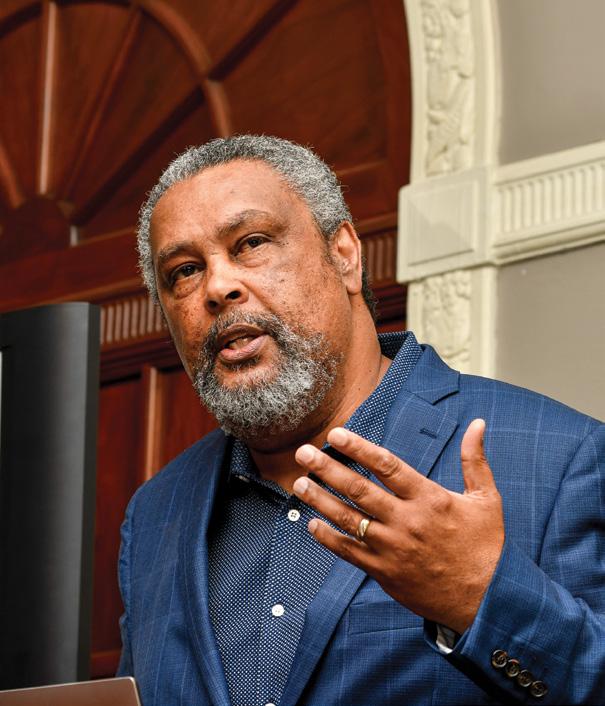
Ironically, the star of the night very probably was one of the few in attendance who didn’t win an award. Academy Award-winning writer Kevin Willmott was the featured speaker and talked about his upbringing in Junction City, Kansas. After attending graduate school at New York University, he said he was drawn back to this area, specifically to Lawrence, because he knew the rich Civil War history of the town would be inspirational for much of the great storytelling that has highlighted his career.
There was a time he might have felt the pull to Los Angeles or New York City, the film-making meccas in the country, but these days, in the era of Zoom meetings, he preaches to his Kansas University students, “It doesn’t matter where you live; it only matters what you’re doing.”
“Lawrence is a great place to live and a great place to raise my kids,” Willmott said. “It’s a real community, and I feel very much a part of the business community, even though I don’t technically have a business. I mean, I don’t have a storefront, but I’ve done business here for forever.
“I came here to do business really.”
Business is what brought this huge group of people together, and being successful and growing those businesses is what was fully celebrated on this night.
“The Lawrence Business Magazine Foundation Awards celebrates and honors local businesses growing and adding jobs, as well as highlighting minority-owned and women-owned businesses,” Ann Frame Hertzog said. “This is such a special evening with the inspiring words of Kevin Willmott and all of the honorees, but it could not be done without our generous sponsors. Their support and investment is how we make this wonderful event happen and continue to grow.
“Notably, our presenting sponsor, INTRUST Bank, has been with us since we started 10 years ago. Our sponsors are truly examples of local businesses supporting local businesses.”
1900 Barker is a neighborhood bakery and café in East Lawrence serving handmade artisan bread and French-style pastries. What began in 2015 as two brothers, Taylor and Reagan Petrehn has since grown to a team of 10-plus individuals doing its part to make Lawrence and the world a better place to live. Recently adding a second location at 816 Mass Street.
From 2020 to 2023, 1900 Barker added five jobs.
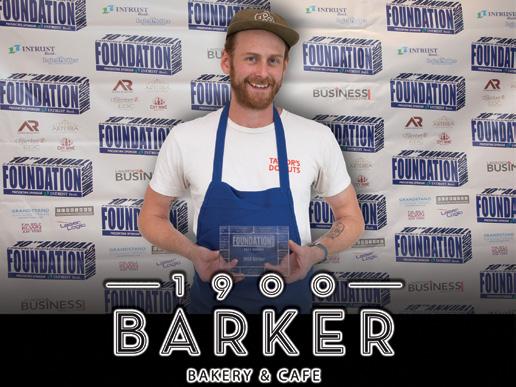

Atteberry Eye Center of Lawrence, KS is an optometrist practice specializing in comprehensive family vision care. Its philosophy is to provide quality eye care to each and every patient. Atteberry combines today’s modern technology with personal attention directed specifically to the needs of patients.
From 2020 to 2023, Atteberry added five employees, bringing its workforce to seven.
In business 54 years, Berry Global creates innovative packaging and engineered products to make life better for people and the planet. The company leverages unmatched global capabilities, sustainability leadership, and deep innovation expertise to serve customers of all sizes around the world.
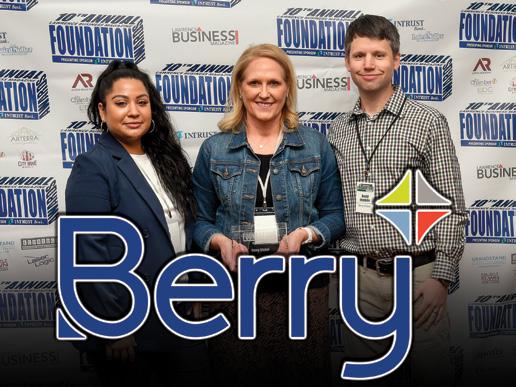
From Jan. 1, 2020, when the company had 787 employees, to Dec. 31, 2022, when it had 1,125, Berry Global added an incredible 338 employees.
Bridge Haven Memory Care, LLC and parent company Beckmeisters, LLC, are companies headquartered in Lawrence specializing in small long-term care homes for individuals with Alzheimer’s, other dementia, Parkinson’s and strokes who need care for memory and/or physical needs. Started in 2007, Bridge Haven has taken care of more than 1,000 individuals in home style settings.
In 2022, Bridge Haven added a fourth memory care home and 20 new employees.

‘The job creation from locally owned businesses is truly the FOUNDATION for a strong, vibrant community. Showing support and honoring the recipients is a way we can reciprocate what they are doing to make Douglas County thrive.’
Beth Easter, Market President Lawrence & Topeka, INTRUST Bank
Caramelo is a minority-owned artisanal tortilla company located in East Lawrence which ships tortillas nationwide. Owner Ruben Leal and his team have shipped to all 50 states, the Virgin Islands and Canada and has wholesale accounts in 15 states, including, of course, Kansas and Missouri. They have also been given a shout out by Al Roker on the Today Show as his favorite tortillas.

In 2020, Caramelo more than doubled its staff of two employees by adding three new employees. The next year, the company added two more to that, and last year, it added two more, bringing the total to nine. That’s more than a three-fold growth during this challenging period.

Construction Specialties is a residential remodeling company providing the best full-service home improvement to Lawrence-area residents. The company specializes in honest, holistic, carefully planned, well executed and clean remodeling of kitchens, bathrooms, additions and exteriors. It employs primarily Lawrence residents and takes pride in its connection to the community.
During the three-year period from 2020 to 2023, Construction Specialties doubled its workforce, adding six positions to bring its total to 12.

Feldmeyer Financial is a minority-owned financial planning firm that over the last three years doubled its workforce. Feldmeyer provides financial services to individuals and small business owners, in everything from retirement planning to investment strategies and more. It is a community involved business that helps people make smart financial decisions to reach their goals and dreams.
In 2021, Feldmeyer added one employee to bring its total of employees to two.
Good Energy Solutions is a full-service energy partner that is able to provide comprehensive consulting and services in electrical, renewable energy and energy management in the central U.S., including Missouri and Kansas. The company is dedicated to customer satisfaction through quality design and installations and backs its promises with long warranties. The company also works with non-profit organizations helping them to lower their utility costs to enable them to use their resources to help others.
Good Energy Solutions added 10 jobs to its workforce between 2020 and 2023, bringing its total to 41.





With origins in Wahoo, Nebraska, JEO Consulting Group excels in engineering, architecture, surveying, planning, community engagement, environmental sciences and funding. Over decades, the company has opened 13 offices and hired more than 300 people, enabling it to solve almost any problem in any place. With roots across the Midwest, JEO Consulting cares about sustaining the places that people call home.
During the three-year period from 2020 to 2023, JEO Consulting Group added eight employees, bringing its total to 10.

Kessler Contractors provides residential and commercial facilities maintenance to include but not limited to plumbing, electrical, HVAC, remodel and general construction.
Kessler Contractors added two employees, from 2020 to 2022.
For 22 years, La Estrella Latina a minority-owned business has been a one-stop shop for foods and supplies for Lawrence’s Hispanic community. Owners Raul and Adany Perez offer everything from tortillas to marinelas to summertime snow cones in traditional Mexican flavors, La Estrella is the place to shop for those seeking authentic Hispanic products.
Over the last three years, LaEstrella Latina has added eight employees, growing its workforce from four to 12.

way to acknowledge this than the awards given tonight by the Lawrence Business Magazine. Congratulations to all award winners and to the LBM for helping to sew
In business since 2005, Lawrence Pet Friends, one of Lawrence’s women-owned businesses, was one of the many companies hit hard by the pandemic. It shut down for two months in 2020 and when it re-opened, did so with only three employees. Since then, it has grown its workforce back to 18, bringing in more than 100 new customers last year.
From 2020 to 2022, Lawrence Pet Friends added 15 employees, raising its workforce from three to 18.

‘As locally owned and operated restaurants (Johnny’s Tavern and J. Wilson’s), we believe in supporting our community, as should all local businesses. We know we need sustainable growth to make this the kind of town we all want to participate and live in. What better
the fabric together.’
Rick Renfro Johnny’s Tavern



Maceli’s is a hospitality and event services company that provides catering at offsite locations as well as in-house at its two Lawrence venues, the original Maceli’s Banquet Hall and it’s new Arterra Event Gallery. During the pandemic, Maceli’s found innovative ways to stay in business – one was creating a curbside – heat and eat option that fed many of us.
On Jan. 1, 2020, Maceli’s had 28 employees, full and part time. On Jan. 1, 2023, it had grown to 47 employees.
Prairie Land Insurance was founded in 1975 in Winona, Iowa and moved to Lawrence in 2011 and is a full-service insurance agency dealing in home, auto, life, crop, farm and business insurance. It is fully licensed in 12 states. And is dedicated to giving back to the community.
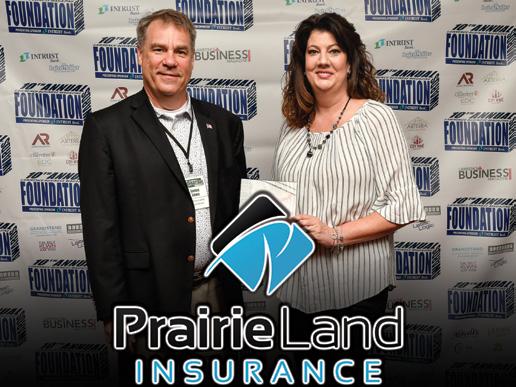
From Jan. 1, 2020 to Dec. 31, 2022, Prairie Land Insurance doubled its workforce, from two to four.

SERC Physical Therapy’s mission is to serve patients treat them promptly with integrity, honesty and compassion. SERC is part of the Upstream Rehabilitation family of clinical care, a network of industry-leading brands providing world-class physical and occupational therapy across the U.S. In addition to in-clinic treatment, SERC offers telehealth PT services by video conferencing with a licensed therapist from the comfort of your home.
In 2022, SERC added three employees to bring its total workforce to four.
Sound Speech Therapy is a women-owned, pediatric speech-language, occupational and feeding clinic committed to providing quality service to patients and families using a collaborative approach. In addition, SST offers myofunctional therapy to both children and adults. This company’s dedication and commitment to core fundamental values truly sets the company apart – the commitment to collaboration and building strong relationships built on trust, not only with patients but with their families.
From 2020 to 2022, SST grew from a one-person operation to a staff of nine.

Family-owned Standard Beverage has grown to become the largest distributor of spirits, wine and beer in the state of Kansas. With multiple dedicated selling divisions, its commitment is to deliver executional excellence for suppliers and exceptional customer service. Standard Beverage has done business in Douglas County for more than 60 years, including having a facility and employees in Lawrence since 1989.
In the three-year span from 2020 to 2023, Standard Beverage added 27 new employees, bringing its total to 164.

Uplift Coffee Shop, a women-owned business, had the good fortune to open in January of 2020, two months before the world shut down. But instead of being slowed or defeated by the circumstances of the day, they leaned in. In 2021, it added a coffee/food truck to bring the business into the community. What began as six employees quickly grew to 10, then 15 and, after adding a second brick-and-mortar building, 25 employees with plans to grow to 30 by summer.

During the three years from 2020 to 2023, Uplift Coffee Shop added 19 employees, increasing its workforce from six to 25.
The UPS Store located at Kasold and Clinton Parkway is a subsidiary of UPS. It provides shipping, packaging, printing, shredding, mailboxes, notary, fax, etc. to the local community and beyond.
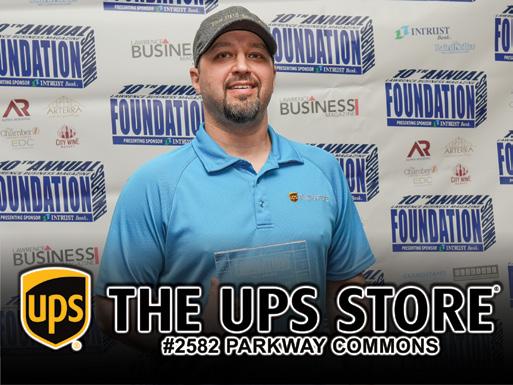
In the three years from 2020 to 2023, the UPS Store added two new employees.
celebrating
we hope it creates a ripple effect of inspiring others, building networks, and driving positive change. As a community, let us continue to champion their endeavors and
knows no bounda -
‘For the 10th year of the Foundation Awards, the Laird Noller Companies wanted to participate in a meaningful fashion. We recognized that the Impact Awards shine a spotlight on the extraordinary achievements of women-owned and minority-owned businesses in our community. By honoring these trailblazers, we felt it was important to emphasize the pivotal role that these entrepreneurs play in driving economic growth, creating employment opportunities, and inspiring future generations. By
the achievements of these entrepreneurs,
work towards a future where entrepreneurial success
ries.’
Zak Bolick, MBA Commercial Account Manager, The Laird Noller Companies
In the inaugural year, there were 12 woman-owned businesses to recognize. This award honors a business that is at least 51% woman-owned and has created a business culture of giving back in the workplace and in the community.
■ Ashley McCaskill Creative, owner Ashley McCaskill
■ Body Specific, owners Leah Henderson & Lisa Lahm
■ Crystal Clear Realty, owner Crystal Sweringen
■ Express Employment Professionals, owner Kate Chinn
■ Hidden Jewel Hair Salon, owner Janine Colter
■ Lawrence Pet Friends, owner Sheree Miller
■ Life Restoration Ministries, owner Nicole Rials
■ Minuteman Press Lawrence, owner Kristi Burgess
■ Pawsh Wash and Pet Health Market, owners Amber & Nicki Nickel
■ Pine Landscape Center, owner Kathy Pine
■ Sound Speech Therapy, owner Kimberly Williams
■ Uplift Coffee Shop, owner Kelli Huslig
Express Employment Professionals recruits for anything from accounting and advertising businesses to cleaning, grocers, painting, plumbing, roofing, and security companies. It has experienced stable growth during the pandemic years, but like most businesses during this challenging period, has felt the strain to keep and retain valuable staff. However, owner Kate Chinn says she feels a sense of pride to know that many of her recruiters are being recruited by other companies in the community. In addition to providing highly-capable employees for dozens of companies throughout the Lawrence community, Express Employment Professionals gives back in terms of personal time given to local charities and organizations. Kate Chinn serves as treasurer for the Lawrence Chamber, is a board member for Heartland Works and is on the steering committee for Community Children’s Center. The company also donates to the Chamber, Lawrence Schools Foundation, Leadership Lawrence and the Economic Development Council and donates time to O’Connell Youth Ranch and LINK.

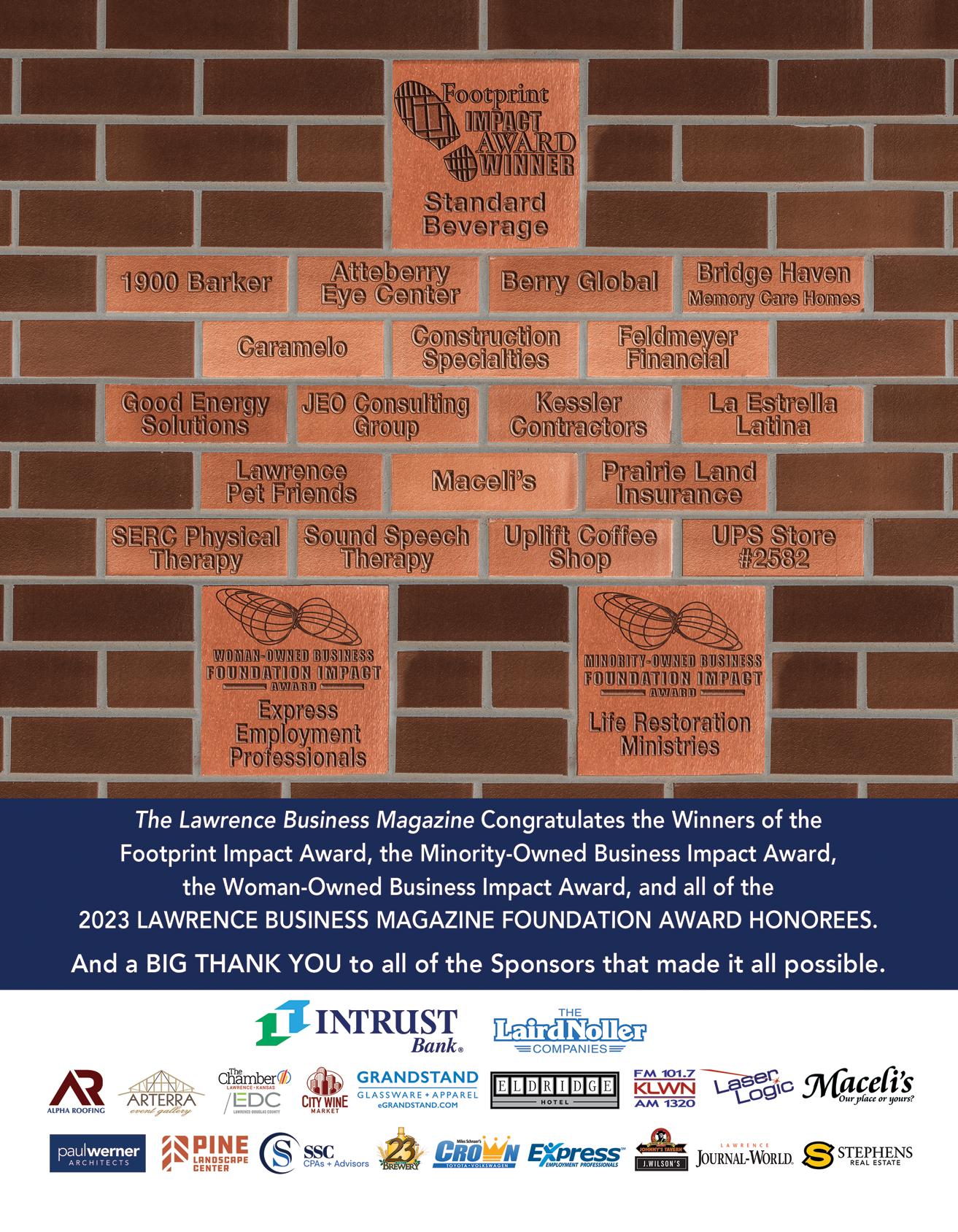
In the inaugural year, there are 7 minority-owned businesses to recognize. This award honors a business that is at least 51% minorityowned and has created a business culture of giving back in the workplace and in the community.
■ Caramelo, owner Ruben Leal
■ Crystal Clear Realty, owner Crystal Sweringen
■ Feldmeyer Financial, owner Ehren Feldmeyer
■ Hidden Jewel Hair Salon, owner Janine Colter
■ La Estrella, owners Raul and Adany Perez
■ Leeway Franks & Butcher, owners Lee & K Meisel
■ Life Restoration Ministries, owner Nicole Rials
Established in 2007, Life Restoration Ministries is a non-profit program that relies on volunteer support. The organization is led by founder/executive director Nicole Rials and board members, all of whom volunteer their time. LRM is built on collaboration and partnerships and has shown significant growth in volunteer resources since 2020, expanding the theatre/arts program to a Lied Center partnership, sustaining and growing the volunteer base in the LRM Theatre program, which has a direct impact on increasing black, indigenous, people of color representation in local theatre. Over the years, the number of volunteers and collaborators has increased 50 percent, and the program is looking forward to continued growth in the future. LRM has a civic-minded multifaceted program that promotes social justice, equity, and belonging through a combined approach of STEM programming, behavioral health, and theatre/arts. Its specific mission and purpose is to provide more theatre/arts opportunities for underrepresented community members by increasing culturally-centered programming.

‘We are so happy to be here and support all the Foundation award honorees. Whether it is earning the award for our own business growth or celebrating other local growing businesses in our county, it is our honor to be a part of this community and a sponsor of this wonderful event.’
Yvonne Ruder, Chief Operating Officer, Alpha Roofing


On the surface, it might look as though Standard Beverage is simply a distributor of wine, beer and spirits to local businesses like bars, restaurants, liquor stores and grocery stores. But the company has always prided itself in forming partnerships with customers, both on and off premises, that go far beyond distribution and sales and focus on working toward common business goals that benefit the community as a whole. Standard has a five-year commitment to the EDC Douglas County Rising Together campaign, having donated $25,000 total to the cause. In August of last year, the company held its first inperson employee engagement event and as part of the celebration gave $100 gift cards to nearly 300 employees to use at local Lawrence establishments. Standard coordinated with six downtown establishments to be featured as designated stops on a “Summer Stroll,” helping bring more business downtown. In December 2021, it hosted an all-company donation drive to collect items for the Douglas County United Way and in the fall of 2022, it hosted an on-site blood drive. Standard Beverage donates financial support to – Cottonwood, Inc., Lawrence Chamber of Commerce, Family Promise, Jefferson’s Foundation, Lawrence Humane Society, Lawrence Old Fashioned Christmas Parade, Lawrence Public Library, Lawrence Police Dept., Blue Santa and the University of Kansas. As a founding sponsor of the annual Salute Festival, Carrie Grove, Standard’s director of charitable events and marketing, serves on the Salute Committee for Cottonwood. These are just a few of the ways Standard Beverage works and contributes throughout the community and shows why it is a worthy recipient of the Footprint Impact Award. p

‘Pine Landscape Center is so grateful for the time, effort and energy Ann and Steven give to the small businesses in our community with The Lawrence Business Magazine Foundation Awards. It has been amazing to see the growth of businesses and the participation in these awards each year.’
Kathy Pine, Pine Landscape CenterAdditional Foundation Award photos are located in the LOCAL SCENE section and online at: LawrenceBusinessMagazine.com/foundation
‘



This award reinforced, not only for me, but even more so, for my staff, all that we have accomplished over the past 3 years. We were one of the first industries to be affected by COVID, and one of the first to retool and reimagine how we operate as a company. This award is a public recognition of my staff for their resiliency and hard work.’



Steve Maceli, Maceli’s Banquet Hall and Catering
The Lawrence Farmers’ Market during the years has become a continually growing, close-knit community of vendors.
 by Darin White, photos by Steven Hertzog
by Darin White, photos by Steven Hertzog
Do you make it to the Lawrence Farmers’ Market on Saturday before 9 a.m.? If not, it’s possible you haven’t had a breakfast burrito, tamale or fresh salsa from Circle S Tamales, because they usually sell out before then. Lines start forming at 7 a.m. The many market vendors start the day early to provide their bounty from the earth and trees, or direct from their hands.
Alejandro Coronado, of Circle S Tamales, says waking up and rolling burritos—they take three to four minutes each to roll—at 3 a.m. is a challenge, but one with great rewards. Seeing vendors and market attendees enjoying his products is a gift. “It’s the best stress relief, better than Prozac,” Coronado says. Even the challenges with the weather, as vendors agree is one of the biggest hurdles to overcome with the market, doesn’t dampen spirits. Since Coronado’s kids were young, they have helped him at the market. They are now moving on to college, which shows how long he has been involved. He loves being part of the market, he adds.
While tamales are very important in Latinx cultures, they aren’t as widely known here in Lawrence. Coronado has had to stop a few people from eating the corn husk surrounding the tamale. Nowadays, more people are aware of and really appreciate the tamale, but the breakfast burritos tend to sell more quickly for Circle S.
Coronado is of Mexican descent, but it wasn’t until he moved to Lawrence that he learned how to make tamales. He learned from descendants of Mexicans who settled in Lawrence in 1908 and whose families have been here ever since. Before this time, he would cook many other types of food, including French and Italian. When Coronado is not rolling breakfast burritos, making tamales or cooking Italian or other tasty recipes, he can be found blacksmithing Nepali or Khukuri knives, a unique hobby of his.
Some vendors at the farmers market take a hobby and make it a trade. Such is the case for woodworker Matt Roman, of Resurrected Woodworks. Roman has been a woodworker for 15 years, making cabinets and trim carpentry, as well as furniture, and he couldn’t bear to burn the scraps left over after a project. At one point, he had been going through some dark times and found solace in making art and woodcraft. So he began carving kitchenware and jewelry to create art with the reclaimed cutoffs, creating Resurrected Woodworks in 2017. “It was funny when I realized how the name ‘Resurrected’ was not only referring to the goods I sold but to my life, too,” he admits.



What started as an additional opportunity to sell his goods other than at art shows has become a continued experience because of the people at the market. “Our community has a deep respect for quality and locally harvested food and crafted goods. I price my goods to be fair to both crafter and consumer, and the Lawrence market respects that,” Roman explains.
He says he enjoys keeping his hands busy sanding while he has great conversations with market patrons. This not only keeps him occupied while tending his booth but seems to be a good draw for others. He enjoys interacting with both the attendees and the other market vendors, and is grateful for the support from not only his clients but also other vendors. He has found the relationships that have developed into the biggest rewards from his involvement in the
Thuy Soldner, of Liquid Garden Juice Co., has found a huge benefit from the relationships with her neighbor vendors, farmers and the community, and as a second-year vendor, she’s grateful for their feedback on her cold press juices and healthy eats, such as protein balls. The juice is made using no heat and only fresh, organic, raw vegetables and fruits that are ground up and pressed into the bottle. They have no added ingredients like sugar or preservatives. Soldner describes her style of juice and food as “Clean eating. Health and wellness. Fruits to roots.”

An example of one of her cold press juices is Grapefruit Bliss, which includes grapefruit, apple, orange and ginger. It has a pleasant aroma of grapefruit followed by the nice, pungent spice of ginger and smooth apple, with an additional hint of citrus from the orange. It is smooth and refreshing. Another example is Strawberry Limeade, with ingredients including strawberry, red and green apples, lime, candy beet and pears—it’s sweet even without additional sweeteners. There is a very subtle, exotic, slightly earthy aroma from the beets below the familiar smell of strawberries and lime. The two different types of apples, pears, strawberries and candy beets create a unique nectar taste, while the lime provides a citrus tang to balance the sweetness.
Soldner and her husband, Jay, are high school sweethearts who came to study at The University of Kansas and stayed. He is a photographer, and she ran a clothing store until she started helping out as the marketing director for a friend’s cold press juice business, Lucky Berry, in downtown Lawrence. When the business shut down, Soldner was passionate about Lawrence needing these fresh, healthy drinks and eats. The couple opened a kitchen in January 2022 for making the juices and protein balls, and they offer pickup as well as delivery. Soldner equates the delivery to the vintage milk bottle delivery but with fresh, natural cold press juices.
She is grateful for the farmers market team and its vision for the future. She loves the social aspect and seeing who comes out to the market, their pets, their families. “The vibe is amazing. It’s a lot of goodness,” she says. The sellers are very supportive of each other, and it is a way of living for most of them. Soldner also enjoys that her 10-year-old came to the majority of the markets with her last year, and she loves promoting healthy living using fresh pressed juices.
Another vendor, Green Fresh, grows many types of edible veggies, including a few varieties of lettuce and three varieties of kale, sweet chard, snow peas, mustard greens, bok choy, green onions, garlic, tomatoes and beans. Ca Saw is the owner of the small farm which grows everything on a half-acre of land. Cut flowers make up around half of the farmers market sales.
Saw is originally from the Chin State in the country of Burma, which has limited roads and access. The state’s religion is a majority in its area but a minority in the country. He left Burma with a friend because of religious persecution and initially moved to Malaysia. From Malaysia, his friend moved to Chicago, while he headed to Kansas City in 2017, where four of his cousins lived. In 2019, Saw got involved with a refuge program called New Roots for Refugees. This three-year program provides knowledge on how to grow produce. After graduating from the New Roots program, he started Green Fresh. The company has been in business for around a year now. He is married and has two children.
Being part of the farmers market has been very helpful, allowing him to build a clientele and sell direct to buyers. Because the farm is small, he doesn’t have enough land to sell wholesale at this time, but he has enjoyed interacting with the market attendees and learning more English.
Saw has noticed that some of the older generations at the market are reminiscent about the vegetables that Green Fresh provides, which reminds them of recipes and good times when they were younger, he explains. Many from this generation know good recipes and ways of cooking different vegetables. Those from younger generations ask questions about how to cook the fresh food he provides—for example the best way to prepare kale—and he appreciates how friendly most people are who visit the market.
When he is not working or with his family, you may find Saw playing soccer, which he loves. Last year, he coached soccer, but with his busy schedule, he had to give it up for the time being. He says he hopes to expand his growing acreage and continue to provide fresh greens and cut flowers for his clients at the farmers market.
Mellowfields Farm is another farm that provides greens and things to the Lawrence Farmers’ Market. It has been in business since 2008, starting out as a CSA (Community Supported Agriculture), and has worked with the farmers market since 2011. A CSA is an agreement where the buyer pays up front for a whole season of produce. The owners started at the farmers market because they had more produce than expected and then realized this was an opportunity to become a consistent and reliable vendor. This is the first year Mellowfields hasn’t been involved with a CSA.
Mellowfields owners Kevin Prather and Jessie Asmussen have 4.5 acres of land and are farming 3.5 of that. The farm is located on the eastern edge of Lawrence, in the Kaw River Valley. It provides many types of vegetables including what they call “Mellowmix,” a variety of eight types of lettuce. Also grown are tomatoes, cucumbers, peppers, potatoes, carrots and beets.
The Lawrence Farmers’ Market has been a great experience for Mellowfields Farm. Even though he is somewhat of an introvert, Prather says he has really enjoyed getting to know people from the community.

Some people attend the market for groceries, others for hot food. Some are college students who may want to eat healthily but do not know how to cook; others are stay-at-home parents who like to cook good food. There are many different reasons they come to the market, Prather explains. “People come for the experience, the activities for kids, music and more. It’s a positive experience.” It’s a great place to be in front of the community and get their brand out there, he adds.
Prather has been on the Lawrence Farmers’ Market board of directors, and one of its committees is currently looking for a permanent location for the market. A location with pavilion space would be excellent for the market, providing solutions to challenges such as the lack of electricity, permanent cover and restrooms.
Prather says he’s happy with the direction of the market and the way it has grown. He says Emily Lysen, who is the director of development, has done a great job.
 Ca Saw of Green Fresh
Ca Saw of Green Fresh
Nina Kinti-Moss, of First Weavers, has been selling her hand-spun, hand-dyed natural alpaca wool fiber, cotton, silk and other material handmade goods at the Lawrence Farmers’ Market since just before the turn of the century. Before that, she was going to art shows with her tapestries and would show her goods at various locations whenever a spot would open up. All her products are hand-dyed using walnut dye or aniline dyes, such as lemon and vinegar, or other natural dyes. She also produces beadwork jewelry, feather earrings and other jewelry. In cooler weather, she offers mittens, hats and pouches. In warmer weather, she offers fresh lemonade, juices and coffee.

Originally from Salasaca, a small dessert community of 12,000 people in Ecuador, she learned the traditional style of weaving using an Indian-style drop spindle. With this style of weaving, you wear a belt and carry the spindle, allowing the weaver to be mobile. KintiMoss says she enjoys demonstrating how to weave the products she produces. She came to the United States as a student in Wisconsin before moving to Lawrence in 1995.
Kinti-Moss enjoys working with her hands. She tries to educate those who don’t know about the traditional weaving. “It takes a lot of time. It requires lots of work, patience, washing, spinning,” she explains. “I can’t stop. Machine-made isn’t comparable to handmade things ... It is priceless.” She keeps track of the time it takes to make the products so she can help people understand their value.
Many people drive long distances to buy her products and also send her products overseas to other countries. The farmers market gives her a venue to sell her wares, share with the attendees and cover additional costs. She says she appreciates the market has “people and vendors [who are] conscientious, organic, careful of what they sell. As well as reasonable pricing.”
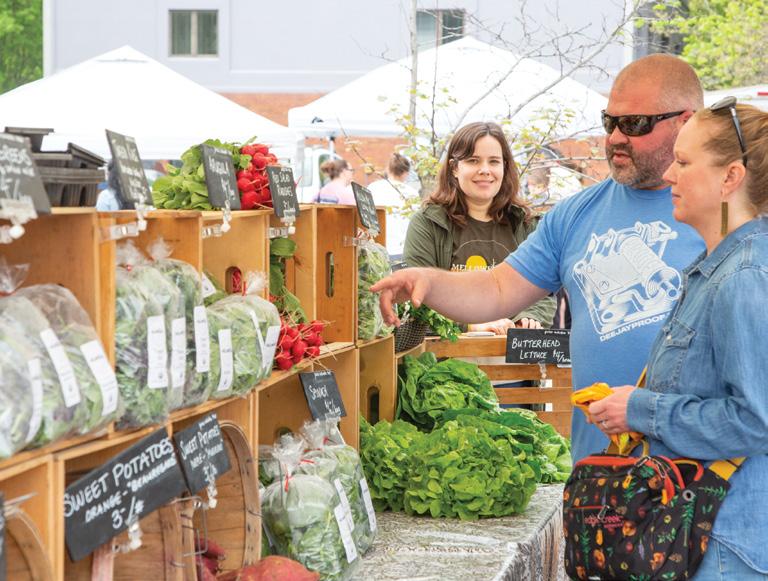


A name that is well-known to the Lawrence Farmers’ Market is Pendelton’s Country Market. It should be well-known: John and Karen Pendleton have been selling at the market for 40 years. In 1980, there was an agriculture crisis that caused their farm, and many others, to switch to growing specialized produce to weather storms both physical and man-made. The couple’s focus was on growing asparagus. They made a practical decision which turned out to be a great marketing decision by creating a waiting list. When a client’s name came up, he or she was limited to only 10 pounds of asparagus. They sold 10 pounds to every client.


Keeping up with trends can be a challenge. Thankfully, asparagus has done well for them. Karen Pendleton says, “Kale was hot, and now it’s not.” Their offerings at market are based on what is in season, so for May, it is asparagus. June is for peas, potatoes and more greens. July is sweet corn and berries. Tomatoes are in July or August. Many people don’t realize that cut flowers are just as important for Pendleton’s as the greens. They pick peonies in bud. The peonies open right before market, which helps them last longer.
The Pendletons used to sell wholesale to restaurants such as Arthur Porters, Tin Pan Alley and Cornucopia. But they are not selling as much wholesale now. They do have a CSA, but a large portion of their business is direct to retail at the farm and the farmers market.
Both John and Karen Pendleton are social and enjoy being part of the market and meeting people who support local farms there. They get a lot of questions about growing, cooking and farm living. In addition to traditionally grown tomatoes, the Pendletons grow them hydroponically, which allows them to be available earlier in the season. Karen Pendleton says they field a lot of questions about hydroponic growing, and she spends a lot of time educating about the weather. The couple decided to start a podcast to answer all those questions and more called “The Stalk of the Town, Our Farm and Community.”
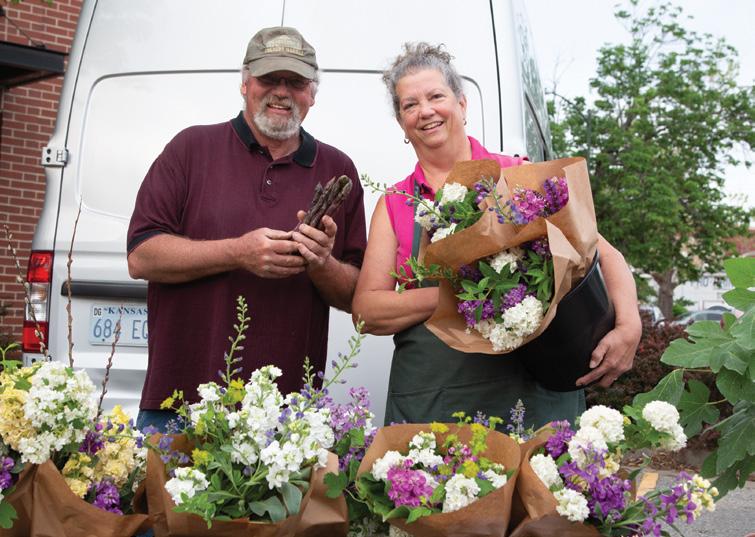 Top: John and Karen Pendleton of Pendleton Country Market showing off their asparagus and fresh cut flowers
Jessica Dunkel busy selling her Slow Rise donuts to her waiting customers
Top: John and Karen Pendleton of Pendleton Country Market showing off their asparagus and fresh cut flowers
Jessica Dunkel busy selling her Slow Rise donuts to her waiting customers

While it is always a good idea to get to the market early, if you have a bit of a sweet tooth, you may want to get there a little earlier to beat the rush created by Slow Rise Donuts. When food scientist and self-taught baker Jessica Dunkel was gifted a sourdough starter from a friend, the first thing she made was a donut, something she had been making off and on for some time. It took some recipe adjustments, but she was able to come up with a unique take on a traditional donut with a filled sourdough donut. “The name [Slow Rise] came from the process of making these sourdough doughnuts; the dough is slowly risen because we use 100% wild yeast (versus commercial yeast), and it takes 72 hours from start to finish,” Dunkel explains.
Slow Rise Donuts as a business has been in operation for a year, and Dunkel and her family thought the Lawrence Farmers’ Market would be a great place to test the market as a startup. Being part of the market has allowed for “some of the freshest local and seasonal fruit and produce that we can use as ingredients in our doughnuts fillings,” she explains.
Dunkel was born and grew up in Indonesia, and in addition to using fresh, local ingredients, she also introduces flavors from her heritage in the donuts. “It’s been really fun to experiment and come up with unique flavors, and I’m so glad that our customers are so open to try them,” she says. Her family loves being able to build direct relationships with customers and other market vendors. The Lawrence Farmers’ Market has more than 60 to 70 different vendors that provide farm-fresh vegetables, greens, meats, fruits, handmade goods, hot meals, drinks and all sorts of bounty from the earth. It is a wonderful Saturday morning experience with something for everyone, including children, to enjoy. It’s a place to walk your pets, learn where your food comes from, see how things are made and meet some great people from the community. Perhaps the next time you go to the farmers market, you might look at the vendors a little bit differently and maybe even consider getting there early to make sure you don’t miss that special treat. p
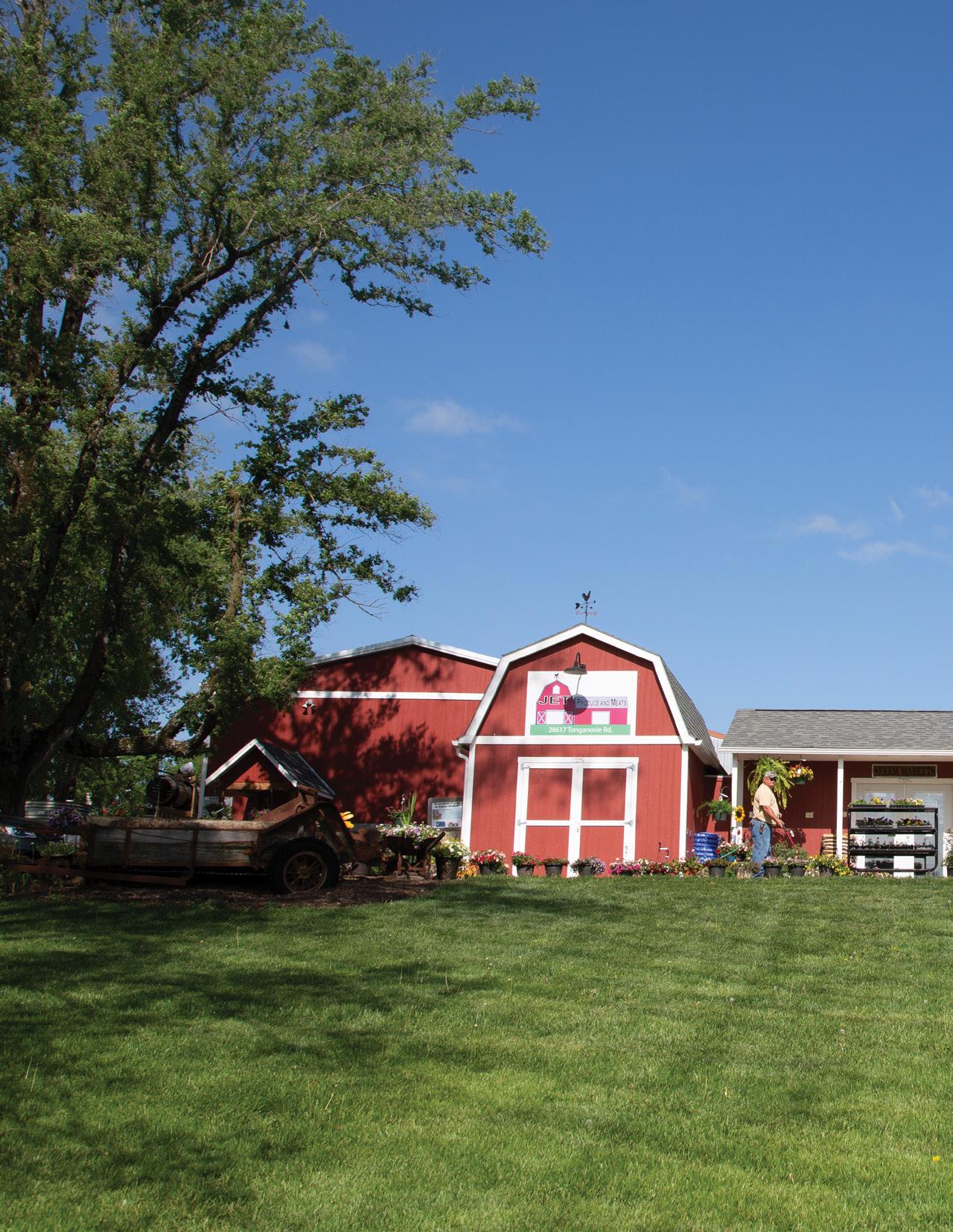
The number of vendors and shoppers frequenting the Lawrence Farmers’ Market has grown significantly over the years, and so has the diversity of products offered.
Farmers markets don’t feel trendy, at least in the way that word applies to fashion or the latest must-stream series. But they are the ideal venue for observing shifts in food and agriculture, especially in Lawrence, which is home to one of the state’s oldest.
The Lawrence Farmers’ Market has for decades been a magnet for shoppers, who today can, depending on the season, just as easily buy pecans, Asian pears, mushrooms, fresh ginger, celery and wine as tomatoes, zucchini and corn. Those who enjoy snacking while shopping can pick up classics like cinnamon rolls and honey sticks, or indulge in more contemporary cravings for kombucha, Greek hand pies, French macarons, cold-pressed juice and sourdough doughnuts.
That’s a far cry from 1976, when early vendors gathered near Eighth and Vermont streets to sell their harvest. Karen Pendleton says when she and her husband, John, owners of Pendleton’s Country Market, joined in 1982, “there were no rules. I don’t remember if we paid to be part of the market, but there wasn’t any structure to it.
“For the longest time, if we had 10 vendors, we had 10 vendors selling tomatoes,” she says.
by Anne Brockhoff, photos by Steven Hertzog The JET Farm and Country StoreToday, there are 65-plus vendors. Many converge on two parking lots on New Hampshire Street, between Ninth and 10th streets, on Saturday mornings 32 weeks a year. The Tuesday night market is in South Park, and there’s an outdoor Holiday Market in December. Longevity has proven a boon for the local economy, in part because farmers markets keep dollars circulating at home.
Seventy cents of every dollar spent at a farmers market stays in the community compared to just 40 cents per dollar spent at big box stores, according to the Kansas Department of Agriculture’s From the Land of Kansas trademark program. Farmers markets also spur spending at nearby businesses—as much as $1.36 for every dollar spent at the market, the Farmers Market Coalition says—and encourage entrepreneurial activity by serving as an incubator for fledgling businesses and helping established ones expand.
That’s been the case in Lawrence, where vendors are increasingly adding more categories to their stalls, says Emily Lysen, the Lawrence Farmers’ Market director of development.
“More people are doing multiple categories,” she says. “They’re not just a produce farmer or meat producer anymore. They also make soap or other things.”
Take JET Produce & Meats, owned by Jacob and Jennifer Thomas. The couple began selling vegetables including broccoli, tomatoes and squash at the Leavenworth Farmers’ Market in 2012. They became a Tuesday vendor at the Lawrence Farmers’ Market in 2015, added Saturday in 2016 and expanded to the Lenexa Farmers’ Market in 2018.
Experiments in greenhouse growing prompted them to build one of their own to start seeds. There was extra space, so they added bedding plants and flowers, then houseplants.
“It just kind of snowballed,” Jacob Thomas says.
JET now has three heated greenhouses plus five high tunnels. Also called hoop houses, these plastic-covered and unheated structures allow for more even watering and protect plants from storm damage, pests and early or late frosts. That, in turn, means better quality—tomatoes have fewer cracks and splits, greens aren’t shredded by the wind or bugs—and a longer harvest window.
“We planted things like broccoli and lettuce on Feb. 1,” Jennifer Thomas says. “All the vegetables on my table except the green onions were coming out of the high tunnels” through early May.
At the same time, customers began asking about meat. So JET started producing its own beef and pork, then added eggs, chicken and lamb. They opened an on-farm store in 2018 to accommodate customers who wanted to shop mid-week or during the winter, upgraded their website and added products like their own popcorn and cornbread mix, as well as jams and jellies, honey, salsa, cheese and milk from area farms.

It’s a lot to manage, and Jacob and Jennifer credit family members with helping run their market stalls and the store. JET also has five full-time and three part-time employees. During the summer, it employs six to eight high school students to help with harvesting. And then there are the customers.
“It was really humbling to me (in April) when we had a customer-appreciation event,” Jacob Thomas says. “We had food for 300 people, and more than 300 people came out. That’s how many people care about us.”
People also care about the Lawrence Farmers’ Market, which is a producer-only market where everything that’s sold must be grown or made by vendors living within 50 miles of Lawrence. It’s an independent 501(c)3 nonprofit, making it unique among markets of similar size in neighboring cities which are frequently underwritten and managed by municipal departments.
The market’s board of directors is comprised mostly of vendors (although it does include some community members), and vendors serve on committees and attend fall and spring meetings. Many are also integral to the Douglas County Food Policy Council, Growing Lawrence, the Kansas Specialty Crop Growers Association and other organizations.

That adds up to a spirit of cooperation that extends beyond market hours, many say. Teresa Flory, of Flory Family Farms, credits the Pendletons for encouraging her and her husband, Roger Flory, to join the Lawrence Farmers’ Market in 2013. Jacob Thomas appreciated their advice when JET began growing flowers—something the Pendletons have long done. When strong winds ripped plastic off several of JET’s high tunnels, Jacob Thomas says John Pendleton arrived the next day with equipment and extra plastic to help.
The Pendletons themselves are grateful for the assistance they received when a microburst damaged much of their farm in 2006 and again in 2019, when a tornado swept through. That time, Juniper Hill Farms brought a refrigerated truck to store the Pendleton’s rescued pe-
 Anna Skenadore and Emily Lysen helping customers at the LFM information booth
Anna Skenadore and Emily Lysen helping customers at the LFM information booth
onies, JET contributed vegetables to help them meet CSA (Community Supported Agriculture) obligations and countless more farmers, friends and customers pitched in to clean up. (For more shout-outs, listen to recent episodes about the tornado on the Pendletons’ podcast, The Stalk of the Town.)
All that is obviously good for folks who need help, but such supportive relationships also build a stronger market, vendors say.
“A lot of people think vendors are in competition against each other,” Jacob Thomas says. “But for the most part, all the vendors get along.”

Still, the past few years have proved challenging. COVID shut the market down for a time; it reopened with a preorder and pickup system, and then with restricted in-person shopping. By the time the Lawrence Farmers’ Market fully reopened in 2021, both customer and vendor numbers had dropped.
“COVID really did a number on farmers markets,” says Karen Pendleton, who sells cut flowers and plants at farmers markets and an on-farm store, offers pickyour-own asparagus, runs a CSA and does wedding and event flowers. “People are coming back to the market now. A full market is a fun market.”
The market has added 31 new vendors since 2021 and continues to recruit more. Lysen credits the market’s vendor outreach committee with developing initiatives including the “visiting vendor program,” which allows
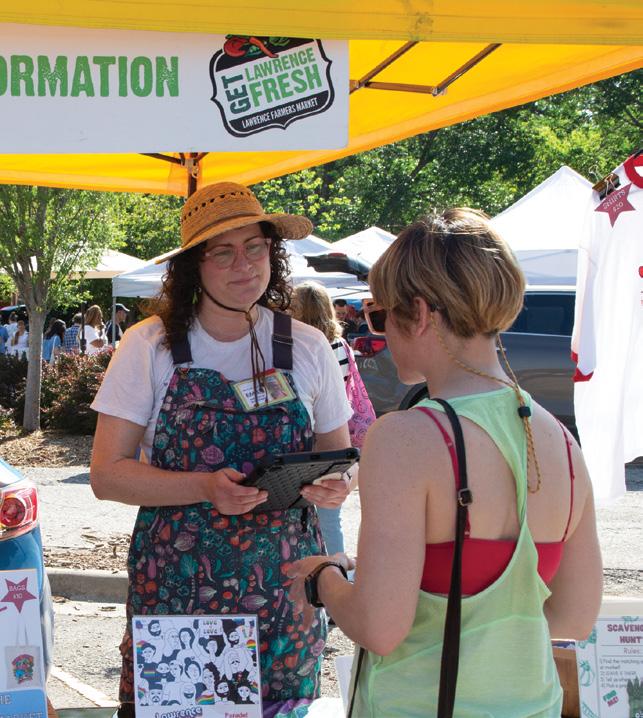
potential vendors to experience the market before committing. The market has also added a vendor handbook to explain details such as stall assignments, setup and tear-down procedures and tokens.
The last can be confusing, because shoppers use three types of wooden tokens. The $5 ones are purchased with a credit or debit card, and are the same as cash; $1 tokens can be purchased using an EBT card by Supplemental Nutrition Assistance Program (SNAP) participants; and SNAP users can get purple tokens for Double Up Food Bucks Heartland, a regional program that matches every $1 spent on fresh fruits and vegetables, up to $25 a day. Some vendors also participate in the Kansas Senior Farmers Market Nutrition Program, which helps low-income seniors purchase fresh fruits and vegetables, herbs and honey.
The market also strives to lower barriers to entry by helping vendors acquire food liability insurance and developing a vendor fee sponsorship program for applicants who are Black, Indigenous or people of color. In addition, the market recently completed a demographic survey to better understand its shoppers and vendors, and determine how to recruit more of both.

“Customers want to see themselves represented at the market, and to do that, we have to find vendors who represent new customer bases,” Lysen says.
Certainly, there’s room to grow. Only about 2 percent of Lawrence’s residents and 1.5 percent of the county’s shop at farmers markets, according to a 2016 study by SCALE that evaluated the Lawrence Farmers’ Market, Farmers Market at Clinton Parkway Nursery, Cottin’s Hardware Farmers Markets and those in Perry-Lecompton and Eudora.



“If we could double that, it would be huge,” Jennifer Thomas says.
 Teresa and Roger Flory at the LFM and home on their farm.
Bottom The Flory Farm
Teresa and Roger Flory at the LFM and home on their farm.
Bottom The Flory Farm



The Lawrence Farmers’ Market has a 2023 budget of $92,500, which is partly financed by membership, advertising and stall fees. Expenses include advertising and marketing, market maintenance, insurance, staff salaries and other business costs. Lysen this year became the market’s first-ever full-time employee; she oversees its marketing plan and programming, volunteers, community outreach, fundraising and grant-writing and management.
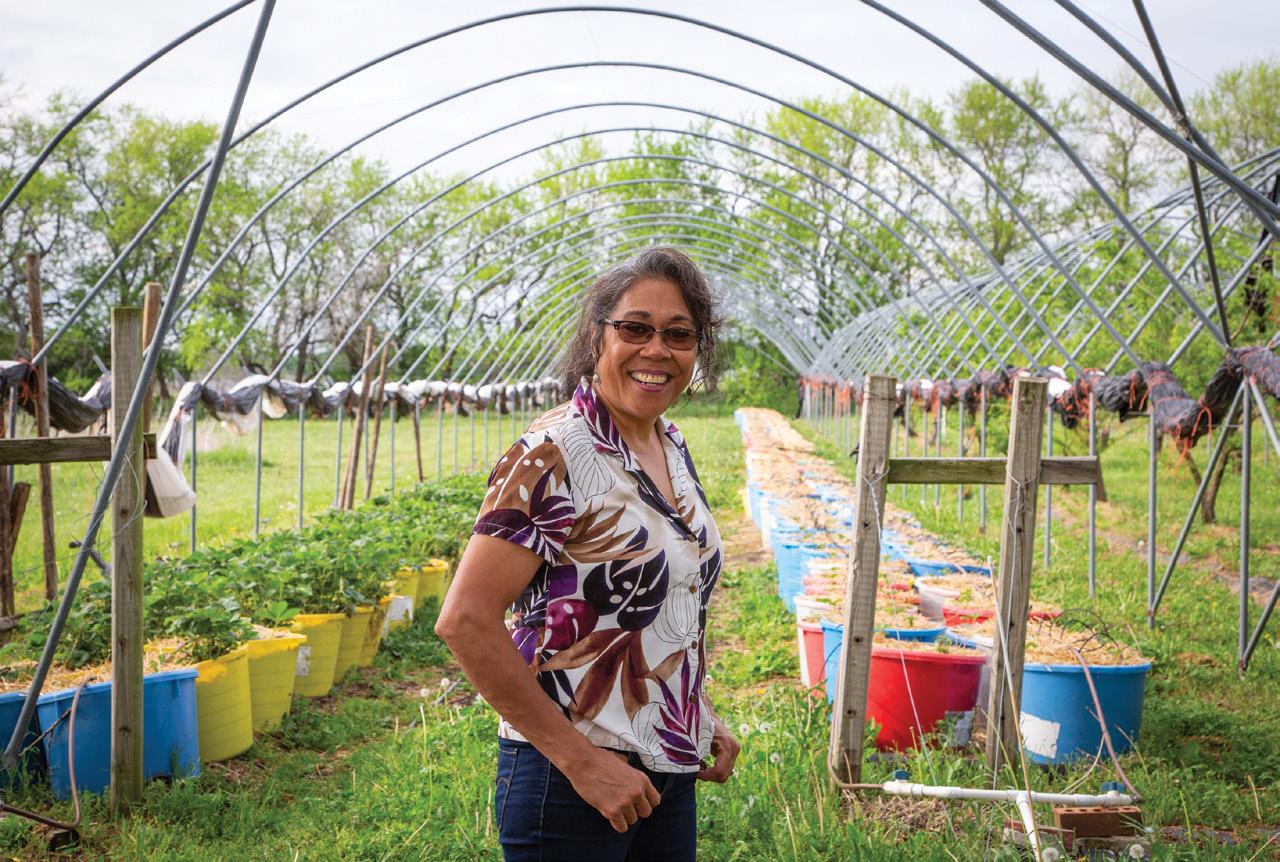
Market manager Anna Skenadore is in charge of on-site logistics on market days, serves as a liaison between vendors and the board, and assists with content creation and social media management. An assistant market manager helps during the busiest summer months.
The market also relies on grant support—Lysen is currently writing a proposal that would help bring initiatives like a market ambassador program to fruition—but is increasingly looking to donations for funding. The Douglas County Community Foundation added the Lawrence Farmers’ Market to its list of recipient funds, and the market received a significant gift from what Lysen calls an “angel donor.” She hopes more will follow. “Grants only want to pay for new things,” Lysen says. “To maintain the quality of the Lawrence Farmers’ Market, we need community support through donations and sponsorships.”
The market also benefits from community partnerships. One of
the most essential is with the City of Lawrence, which provides both locations free of charge. The city and market have long discussed the possibility of creating a permanent downtown Lawrence location with improved facilities, but a site meeting all the market’s needs has yet to be identified.
Kansas State University Research and Extension offers outreach through Master Gardeners of Douglas County (it helps with food-recovery efforts), Double Up Food Bucks Heartland and nutrition, SNAP education and other programming. LiveWell Douglas County, the Douglas County Food Policy Council, City Playcorps (which hosts pop-up playgrounds at the Tuesday market), local chefs and more are also active partners.
The market welcomes community booths, too. It regularly offers entertainment and special events (such as celebrating Pride month in June) and is continuing children’s programming, including the popular Scavenger Hunt.
“All the kid activities make families want to come,” Teresa Flory says. “It’s something fun to do on a Saturday morning.”
The Florys have been raising pigs since 1988, when one of their three sons wanted to show them in 4-H. Their sons are now grown, married and have off-farm jobs, but everyone—including their seven grandchildren—remains involved. Tim and Jana Flory raise Boer goats, while Brian and Julie Flory and Mark and Jessica Flory are partners in the family’s farrow-tofinish hog operation.


The Florys started selling pork at the Farmers Market at Clinton Parkway Nursery in May 2013 and joined the Lawrence Farmers’ Market later the same season. They offer staples like pork roasts and bacon, as well as specialty products including chorizo, ground sausage and mango-habanero brats. They used to supply meat to Roger’s cousin, Don Flory, who sold sausage biscuits and cooked Polish dogs at the farmers market. When Don stepped back from that in 2018, Roger and Teresa bought his grill and added sandwiches to their own offerings.
“When it’s barbecue season, the meat does really well, the burgers and brats,” Roger Flory says. “When it’s cooler and people aren’t going to the lake, they come down for breakfast.”
Still, each season brings its own uncertainty; this year it’s inflation. Like U.S. retail food costs, wholesale food costs soared last year. They leveled out in April but remain 26 percent higher than in February 2020, the National Restaurant Association says. That means prepared-foods vendors are likely still paying higher prices for ingredients such as butter and eggs.
The same is true for those selling produce and meat. Prices for essential supplies and shipping costs have risen, says Jacob Thomas, who notes egg cartons that were once 25 cents each were in April twice that. Roger Flory says hog feed has almost doubled in price, and meat processing, fuel prices, property tax and other farm expenses have also jumped in the past year. “We have to go with the market on any given day,” he says. “If corn goes up, we pay more for it. If gas goes up, it costs more to drive our truck and trailer.”
Many Lawrence Farmers’ Market vendors have so far resisted charging more for their own products, opting instead to adjust elsewhere. Some advertise slightly smaller quantities at familiar price points. Others are counting on reductions in state sales tax to buffer shrinking profit margins.

Kansas in January reduced the amount of sales tax it charges
on food and food ingredients by 2.5 percent. That means sales tax on fresh produce, meats and other unprocessed items sold in Lawrence dropped to 6.8 percent; the sales tax on heated and ready-to-eat products and prepared foods remains at 9.3 percent. Although some vendors, such as the Florys, calculate sales tax at the time of sale, others include it in each item’s advertised price. A slight drop in the tax rate simply offsets higher costs, allowing them to keep prices steady.
So far, customers have been supportive and understanding, says Lile Merrill, who owns Trails West Farm with her husband, Quill Merrill.
“I am not worried about it,” she says. “I think all the customers understand inflation.”
Lile, who is originally from Tonga, and Quill met in Hawaii and moved to Lawrence in 2006. They bought their farm near Eudora a year later and set about learning to manage the apple, pear, apricot, cherry, peach and other fruit species already growing there.
“I grew up in the South Pacific on a farm, but we had tropical fruits like coconuts, oranges, passionfruit, tangerines—things like that,” says Lile Merrill, who raises strawberries, 15 types of pears (including her favorite Asian pears), apples, Sand Hill plums (a native variety coveted for jam and jelly) and other fruit.
“We had to have a crash course on how to take care of these.”
They’ve sold their harvest at the Lawrence Farmers’ Market since 2008; they’re also Overland Park Farmers’ Market vendors and supply fruit to USD 497. Still, it’s not easy. Take this spring—overnight temperatures in early May dropped into the 20s, damaging flowers and buds on early-blooming apricots and cherries, and curtailing fruit production. Such losses are just part of being a farmer, Lile Merrill says.
“We have these customers we love, and it’s one of the main reasons we keep coming” to the Lawrence Farmers’ Market, she continues. “We’ve met so many people who are so friendly. It easily makes our day worth it.” p


Workers on small-scale farms run the gamut from teens to part- and full-time workers to those who want to someday run a farm of their own.
by Emily Mulligan, photos by Steven HertzogSometimes they are the friendly face at the Lawrence Farmers’ Market booth. Or the delivery driver who brings the farm’s bounty to local restaurants. Other times, they are the ones picking and laboring in the fields, covered in dirt and laden with sore muscles and tired hands.
Workers at small-scale food farms in Douglas County are key links in the food chain. Their literal and figurative fingerprints are all over the farm operations and products that come from our local land and nourish us.
Local farm owners hire a variety of folks to work, from seasonal to year-round, from part-time youth weekend help to full-time farm staff and interns hoping to be able to have their own farm someday. And everyone in between.

Conor Brown returned to full-time farm work in January. He quit his full-time, nonfarming job and is back working for Mark Lumpe, at Wakarusa Valley Farm, where he has worked in various capacities and intensities since 2010. Lumpe, in his mid-60s, has been looking for someone who may be able to take over the farm. Brown would like to make that happen, as well.
A lot has changed at Wakarusa Valley since Brown first began working there. The farm is now a mushroom farm, growing many varieties of mushrooms for restaurants, the farmers market and retail. The cool, clean underground grow rooms are a stark contrast to the sunny, hot fields above that, 13 years ago, were filled with vegetables and salad greens. There are still vegetables that Brown grows at Wakarusa Valley, but he grows them under his own name, for the Rolling Prairie CSA instead of for Lumpe.
Abby and Liz mow between the rows of strawberries“I started working out here because of gardening,” Brown says. “I’ve ended up working with mushrooms. There’s a lot to learn about it.”
The mushroom grow rooms are in what he calls cave mounds: concrete mounds with soil piled on top. The mushrooms grow in sterilized 5-pound bags stuffed with substrate, which is like sawdust. Brown stuffs the bags (more than 100 of them) and sets the proper conditions, but the real work starts when the mushrooms begin growing. “Every day, at least half of my day is spent picking,” he says. “Mushrooms need to be picked every day, and I’m the only one who picks them.”
Brown says he enjoys the solitary element of the work with mushrooms—especially in contrast to the job he left in December, working in a group home.
“I like the routine. I like going to harvest mushrooms, and there are just a whole bunch of them—going into the grow room and knowing I’m picking all these mushrooms, and people are going to be excited about them at the market,” he says.
Originally from Leavenworth, Brown graduated from the University of Kansas with a degree in anthropology. He pursued an anthropology graduate degree in Canada before returning to Kansas. He worked other jobs but kept feeling pulled to do gardening.
Though it sounds controlled and repetitive, Brown insists there is a lot of variety to mushroom farming, and it leads to new life experiences.
“I do like trying to grow new varieties—trying to get something new to grow and then eating it, because sometimes it’s something I’ve never eaten before,” he says. He can counterbalance his time underground with fungi by working the fields for his own vegetables to sell to the CSA. Lumpe lets him use the farm’s land, and Brown grows about 20 different things for Rolling Prairie, including potatoes, onions, garlic, peas, carrots and radishes. Even when he was working elsewhere full-time, Brown was growing vegetables for restaurants, the market and the CSA on Lumpe’s land. Now, though he is doing very different projects, the vegetables and the mushrooms all add up to making a living as a farmer.
“As soon as I started farming, I hoped I could do it full time. I wasn’t sure I could get away with it, but here I am finally,” he says.
Wohletz Farm Fresh has been a family farm since 1996 and has been a “U-Pick” berry farm since 2009. Since last year, the farm has become exclusively strawberries and blueberries, which are harvested by farm visitors.

Jerry and Jane Wohletz own the farm and for years have hired teenagers to help with basic farm jobs, as well as to help host the farm’s guests when they come for picking. The berries are planted in December, but the work for berry season commences in earnest around spring break, when the workers uncover the plants and perform the tedious task of removing dead leaves from each individual plant.
The Wohletzes say they usually hire eight or nine teenagers as well as a couple of adults to work part time from spring break through the end of blueberry season, which is typically in August. Many of the teenagers return multiple summers to work.
“Something I’m the most proud of is that we are giving these kids their first job. There’s a lot of lessons that are learned,” Jerry Wohletz says.
Workers maintain the plants as well as the rows between the plants so that visitors can traverse the farm easily. They learn about ripe fruits and picking techniques, as well as how best to communicate with the public who come to the farm. “We are always telling them, ‘You’re representing our farm,’ ” he adds.
During the designated U-Pick days, the workers are stationed along the rows where picking is taking place. They instruct the pickers about which berries are ripe and show them how to pick properly, all while politely making sure that pickers stay on the grass and don’t trample or damage the plants.
The Wohletzes train the workers, and the longer-term workers instruct the newer workers along the way, as well.
“Jane and I are in the field with them. They learn their responsibilities and also the pace we expect,” Jerry Wohletz says.
Abby Keltner and Liz Mueting are in their fifth year of working at the farm. They began working at Wohletz in eighth grade and graduated from high school this spring. Keltner’s first responsibility on the farm was mowing the rows with a push mower, and Meuting started out weeding the plants. When they started, the farm was still growing produce for weekly farmers markets in Lawrence and Johnson County, so the young women say they were “always harvesting.”
Now, their work is focused on the strawberries and the blueberries. It hasn’t been a question for them whether they would come back each summer.
“The customers and the people you work with, that combination just makes you want to stay forever,” Keltner says.
The pluses to the job are obvious: the literal fruits of their labor. “No blueberry tastes the same as the ones at the Wohletz farm,” Mueting says. Keltner agrees, adding that her perceptions are forever altered by this work. “I will never see the berries at the grocery store the same again.”
They both have favorite ways to eat the berries: plain berries, muffins or strawberry shortcake for Mueting, and strawberry pancakes for Keltner.
There is no getting around the fact that it is hard labor at times. Both young women say they have shirts and shoes they designate only for work at the farm. They agree with each other that some of the hardest work comes at the end of the season, when they cut out the patches and plants, and end up covered head to toe in dirt.
This berry season will be the last for both Keltner and Mueting. Next fall, they are leaving for college at Washburn University (Keltner) and Wichita State University (Mueting), with no further plans for farming or agricultural studies of any sort.
Lacy Myers is looking at her farming work experience from the proverbial other side of the fence. After nearly 10 years of working for other farmers and raising vegetables planted on other people’s land, Myers and her husband, Bobby Sauder, purchased Wild Hollow Farm in


 Top to bottom:
Connor Brown explaining the different mushrooms to a customer
Lacy Myers working their stand at the market Bobby working on the farm with their children
Top to bottom:
Connor Brown explaining the different mushrooms to a customer
Lacy Myers working their stand at the market Bobby working on the farm with their children
fall 2020. Both had worked for Lumpe at Wakarusa Valley Farm, and Sauder had worked at Pendleton’s and Washington Creek Lavender, while Myers also had worked at The Merc. Wild Hollow is a vegetable, fruit and flower farm, and both Myers and Sauder have brought their knowledge from previous farmwork to Wild Hollow. They have one employee, as well.
“The goal of any farm should be to provide a volume of produce but also to provide good-paying jobs that are respectful of the employees. You should make the farm a place where employees feel at home and are part of a collaborative effort,” Myers explains. Not all farm employees are necessarily working toward the goal of owning their own farm, she adds.
“I don’t know when we moved from ‘We like farming’ to ‘Let’s have our own farm.’ It’s a wonderful lifestyle if you want to spend time with your family and be outdoors,” Myers continues.
All kinds of people from all types of backgrounds work at farms, yet Myers has noticed some common characteristics that local, small-scale farmworkers seem to share: stubbornness (the attitude of “I’m not going to let anything beat me”); enjoyment of hard work; an appreciation of the cycles of the environment, the seasons and the weather; and a sense of humor.
The workers can focus on the short term, she says, while “the farmer definitely has the mental load” of the bigger picture and the whole operation. That can be both a privilege or a burden, depending on the worker.
“You can be as interested or disinterested as you want to be in what all is happening at the farm. If you’re interested in having your own farm someday, there is infinite opportunity to learn,” Myers says.
The farm lives of Brown, the Wohletzes, Keltner and Mueting represent smaller-scale food farms in Douglas County and are not reflective of factory farms or large operations that rely on migrant workers or have unions. It is safe to say with all the knowledge and work experience generated at these local farms, the people on Douglas County farms are extracting much more than vegetables from the soil. And they are contributing much more than the food on local residents’ plates.
“Farms that can have employees and have them year-round in Kansas, that’s a feat. For it to really be a part of the economy, you’ve got to have year-round employees,” Brown says. p

Shoppers at the Lawrence Farmers’ Market range in age and profession, from college students to retired couples, business owners to community leaders, and have myriad reasons for gathering.
 by Bob Luder
by Bob Luder
It was a few minutes before 7, the sun barely up on a record cold April morning in Lawrence, and a line already was forming in the parking lot between Seventh and Eighth streets on the east side of New Hampshire. The Lawrence Farmers’ Market, on just its third edition of the 2023 season, wouldn’t open for another half hour or so, but already 30 to 40 shivering souls waited patiently to get their now-numb hands on the deliciousness that is a doughnut from Slow Rise, a pop-up business that specializes in a variety of small-batch sourdough doughnuts.
“It’s my favorite doughnut,” says Daria Gerasimova, a researcher at the University of Kansas (KU), managing a smile through chattering teeth and fog breathing through the cold. “It’s my third year coming to the market but my first time this year that I tried these doughnuts. It’s worth standing in line for.”
Many agreed, as evidenced by the dozens who accompanied her in line. And as the minutes marched on and the farmers market officially opened at its traditional 7:30 a.m., the crowds only grew despite the stiff north wind and cold. If they weren’t standing in line for a doughnut, they were shuffling about perusing any of the other dozens of vendors selling everything from produce, flowers, soaps, honey, barbecue, baked goods, smoothies—the list nearly is endless.
Patrons mostly shopped, but some were there to merely meet acquaintances they’d met at the market some time ago or simply take in the sights, smells and sounds of what seemed a small-town community in the middle of a larger, bustling college town.
“We’ve added 30 new vendors in the last three years,” says Emily Lysen, in her third year as director of development for the Lawrence Farmers’ Market. “We have about 65 vendors, offering everything from flowers, baked goods, prepared foods, wine, coffee, some crafts and pottery.
“And, the important thing is, we ask people here to be as local as possible,” she adds.
After weathering a couple challenging years because of the COVID-19 pandemic, the market has begun to again thrive, Lysen says, oftentimes topping 2,000 patrons on Saturday mornings where the wind chills aren’t in the low 20s.
Not that the wintery conditions hurt business at the Slow Rise tent. Owners Jeff and Jessica Dunkel began creating their delicious concoctions at midnight Friday. They brought 600 of the classic, classic cinnamon, mudpie, Bavarian and others to the market. A little more than an hour and a half in—at 9:11 a.m. to be precise—they sold their last available doughnut, leading to groans from hungry shoppers late to the party.
“We get here around 6:45, 7, and people are already standing in line waiting,” says Madison Wyant, who served doughnuts for Slow Rise this morning. “Maybe it’s the ritual of coming down here early, but they’re here rain or shine. I often recognize an old classmate or acquaintance. It’s fun.”
Jeff Dunkel says, “I’m always just so humbled and appreciative of how nice people are here every week. I really like the pop-up concept because you get to really talk to customers. Someone drove all the way up from Wichita one time. Another lady was first in line every weekend, and she was from Topeka.”
That appears to be an overriding theme among most patrons of the Lawrence Farmers’ Market: While the products and prices are great, it’s the people-watching and social aspects of the market that keep them coming back.


The pandemic forced the farmers market to make a lot of adjustments through 2020 and ’21, Lysen explains. Drivethrough pick-up was offered. Tents were required to allow a normal tent-sized open space between vendors. Masks were required for all vendors and shoppers. Many vendors went away during that time, and foot traffic slowed.
But at least on this day, all those hard times seemed long past. As Lysen states, dozens of new vendors have come aboard the last three years. Last June, an official customer count concluded 2,600 people coming through the market on a given Saturday, up from 1,800 on an initial count in 2019 and a market record.

The Lawrence Farmers’ Market doesn’t allow just any vendor onto its premises either. Restrictions on craft- and potterymakers are especially strict, Lysen says. Any craft vendor must produce at least 75 percent of source material for their crafts. All baked goods must contain at least 50 percent locally grown products.

To be a vendor, a business cannot have a store front, meaning all are pop-up businesses such as Slow Rise.
“We have some longtime vendors who were grandfathered in before all the restrictions,” Lysen continues. “But having local businesses doing business locally is very important to us.”
It’s what’s kept stalwart Lawrence businesses like Pendleton Farms coming to the farmers market every Saturday for the last 40 years. Every Saturday morning, one can find owner John Pendleton behind tables of fresh asparagus, spinach, broccoli and tons of other fresh produce in the southwest corner of the market’s parking lot. Being perched in the shade of a large building directly south provided for an especially frigid setting this April morning, but Pendleton quickly says the payoff more than comes back in the middle of the summer when the heat builds in.
 Shopping at the Farmers' Market
Shopping at the Farmers' Market
“Saturday mornings down here is a tradition,” Pendleton says. “This is on everyone’s schedule. We have weekday markets around town, and that’s just not the case with them. Every weekday market is a challenge … this is not.”
With his family’s farm situated just five miles from Eighth and New Hampshire, Pendleton feels as though the Lawrence Farmers’ Market is almost an extension of the farm. It’s home.

“This is such a good market,” he says. “The biggest thing is the consistency of where you set up. I like our neighbor vendors. Everyone gets along. And we have regular shoppers I recognize from weekend to weekend.”

Many of the market’s shoppers have made weekly visits into family traditions. Count Lawrence native Greg Rupp among those. On any given Saturday, he’ll walk from his home down to the market, usually with one of his children. On this day, he was at the market with his son, Thomas, and friend Andy Lees. They even have a ritual they follow.
“We go out early, take a lap and survey,” Rupp says. “Then we take a second lap and shop. It’s vegetables when they’re inseason—I love the beets, okra. Then we have the folks over for Sunday dinner, using the veggies we bought.
“We also usually get breakfast while we’re down here,” he adds.
Thomas Rupp seemed to be completely enjoying his time with his dad and friend, despite the chilly air.
“It’s nice just walking down here, the routine every Saturday,” he says. “We say hi to the people, run into people we know.”
Lees says, “For 20-plus years, we’ve come down pretty much every weekend. We both are sure to get treats for our wives and bring them back.
Tulips for sale at the Farmers' Market“The one thing you enjoy is seeing people you know. It just has that small-town feel,” he continues.
Toni and Walt Clogston moved to Lawrence from St. Louis a year-and-a-half ago and say the farmers market has been one of the greatest treats of their new home. Residents of East Lawrence, they say they walk to the market most weekends with their two dogs—Dancer, an Irish setter, and Tango, a golden retriever—in tow … or, being towed by them. Toni says she comes for a sausage and biscuit breakfast, and often buys pork chops or brisket from Flory Family Farm. On this day, she purchased eggs, honey and mushrooms.
“Sometimes we see our neighbors,” she says. “I just love the neighborhood feel.”
Walt says, “It’s great to see the community come out. And we got some delicious produce. You can’t beat it. Living downtown is great.”
For a vast majority of college students, Saturday morning is a time to sleep in, rewarding oneself for completing another hard week of classes or recovering from a late Friday night rewarding oneself for completing another week.
That’s not the case with all, however, as several groups of college students were walking around and examining many of the booths at the farmers market early this morning.
“This reminds me of the farmers market back home in Wichita,” says Mckayla Wheeler, a junior at KU majoring in exercise science. “I come down here looking for everything: bread, fresh fruit and vegetables. I got some kale.”

The Lawrence Farmers’ Market has a strong presence on social media, and that’s how organizations get through and communicate with today’s young people. Wheeler and the friend with whom she was shopping, fellow junior Audra Webster, discovered the market through its Facebook page.


“Lawrence just seems nicer,” says Webster, who’s majoring in psychology. “The community’s nicer and calmer. The vendors here are so nice, so sweet. I feel like I’m being cared for when I’m down here.
“I feel like, if I have a question, it’s going to be answered,” she adds.
Keely English, Maddy McGavran and Madison Hilgenkamp, all students at KU, also chose to shop at the farmers market on a cold Saturday morning in search of the very freshest foods they could find.
“I usually come here for eggs and local produce,” English says. “Or kombucha. I think the eggs are honestly better here. Really fresh.”
For McGavran, who’s from Olathe, it was her first time at the market.
“I came down to look at some honey,” she says. “But I just wanted to walk around and look at all the different products. I like supporting local businesses.”


Hilgenkamp says she’s familiar with farmers markets because of the small one that operates near her home in Omaha.
“It’s a smaller farmers market,” she says. “I like this because it’s bigger. It’s fun to talk to the people who are selling, talk to them about their products.”
Some at the Lawrence Farmers’ Market weren’t there to shop, buy or sell, but rather to just be seen and talk to people about their organizations and what they do.


Marissa Boyle, quality improvement manager at Bert Nash, a community mental health center, stood steadfastly at a table adorned with an apron promoting the center and chatted with anyone who stopped by wanting to learn more about it.
“I hope to have a different type of outreach,” Boyle says. “We’re always striving for a strong community connection. I usually try to have one staff member and one board member here each weekend. It’s important to get feedback from the community and access people in a new and different way.
“And it’s fun to come out and have a doughnut and just see and meet new and different people,” she says.
Ah, yes, back to the savory Slow Rise doughnuts, which prompted the long line in the wee hours of a frosty mid-spring morning. As Gerasimova waited patiently in line for the delicious concoctions under the tent, the native of Russia began making a list in her mind of what else she wanted to pick up for the week.
“I love the high quality of the produce and the fact that it’s grown here,” she says. “I think it’s better than what a grocery store can offer.
“They have vegetables here not available at a grocery store, like kohlrabi. It’s better in the summer, but I can also get some eggs and honey today,” she continues.
And if, in the meantime, she gets to sink her teeth into a mouthwatering doughnut, or two, so much the better. At the Lawrence Farmers’ Market on this day, it seemed as though everyone could warm up to that. p




During asparagus season, Pendleton’s Country Market works with a lot of restaurants. That might have something to do with the fact that they have a whopping 15 acres of the crop. When you consider that the farm started with just a half-acre and 1,000 plants in 1980, that is, as owner Karen Pendleton dryly puts it, a “fair amount of asparagus.”
There’s a huge difference between farm-fresh asparagus and asparagus that is shipped in from California, she adds.
“Asparagus, tomatoes, sweet corn—those three things are difficult to ship with good results,” Pendleton says. “The difference between a local, freshly harvested asparagus is night and day compared to what would be shipped in.”

Despite the amount of asparagus the Pendletons sell during the season, they’re so busy, they can’t take on any more restaurants than they already have. And even those—Free State Brewery, Limestone Pizza and Merchants Pub & Plate, with an occasional add-on—are required to go out to the farm and pick it up,
because the Pendletons don’t have the time to take it into town.
“If we were delivering vegetables all season long, we’d have a delivery thing set up,” Pendleton explains. “But we’re only doing this for six weeks out of the year, so they have to come pick up their own asparagus.”
In addition to their own store east of town, Pendleton’s produce can be also found at the downtown farmers market, but well over half of their vegetables are sold through Pendleton’s Community Supported Agriculture program (CSA), in which subscribers get a weekly box of produce.
“We have 150 families that we feed with produce every week from the second week of May ’til the end of September,” Pendleton says of their CSA. Additionally, that subscription includes a copy of Pendleton’s CSA recipe book, which provides invaluable tips for cooking some of those vegetables with which subscribers might not be familiar.
“Most people know what to do with sweet corn, lettuce, that sort of thing,” Pendleton offers. “So we have a lot of recipes in there that would include things like kohlrabi and eggplant and okra— the things that people aren’t quite as familiar with on a regular basis.”
The Lawrence community is surrounded by myriad farms that produce the fresh foods that pop up not only at the farmers market but also on the plates in local restaurants.Karen Pendleton displaying basil plants in the green house. Right: Customers surround the Pendleton Country Market at the Lawrence Farmers’ Market
Phillip Holman-Hebert, owner of Sweetlove Farm, also provides recipes. But what comes from his plot of land, just west of Oskaloosa, is likely more familiar to the average cook—his pastured poultry, raised for both eggs and meat. To anyone who’s had his birds, be it to cook themselves purchased from Leeway Butcher or the farmers market, or on the menu at Merchants and Kansas City’s Fox and Pearl, there’s a noticeable difference in quality and taste.
Sweetlove’s specialty comes from Joel Salatin, author of “You Can Farm: The Entrepreneur’s Guide to Start & Succeed in a Farming Enterprise,” among many other books.

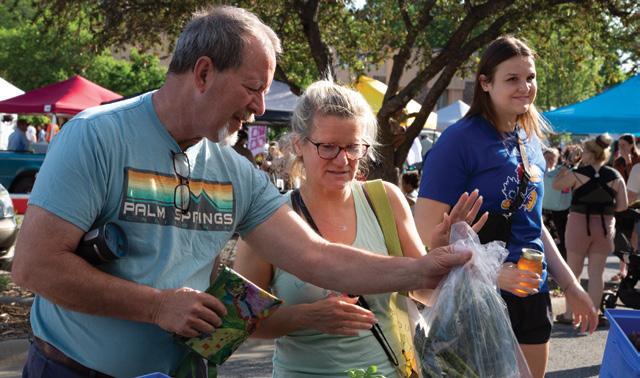
“He is the probably the strongest voice advocate of the type of farming we do up here, which is referred to as grass farming or pasture-based farming,” Holman-Hebert says. “We’re trying to integrate the raising of livestock naturally into the ecosystem of a grassland. Salatin was the primary national voice and proponent of this new way of thinking about farming.”
Salatin started advocating for this style of farming back in the late ’80s and early ’90s, and Holman-Hebert got familiar with him when he started reading Salatin’s books in the later ’90s, just as he was getting ready to start his farm. His books were largely manuals for beginning farmers on how to raise pastured poultry and pastured cattle for beef profitably.
“That seemed like a good place to start,” the farmer explains, saying that he and his family chose to go with chicken because, for a complete startup like they were, they required the



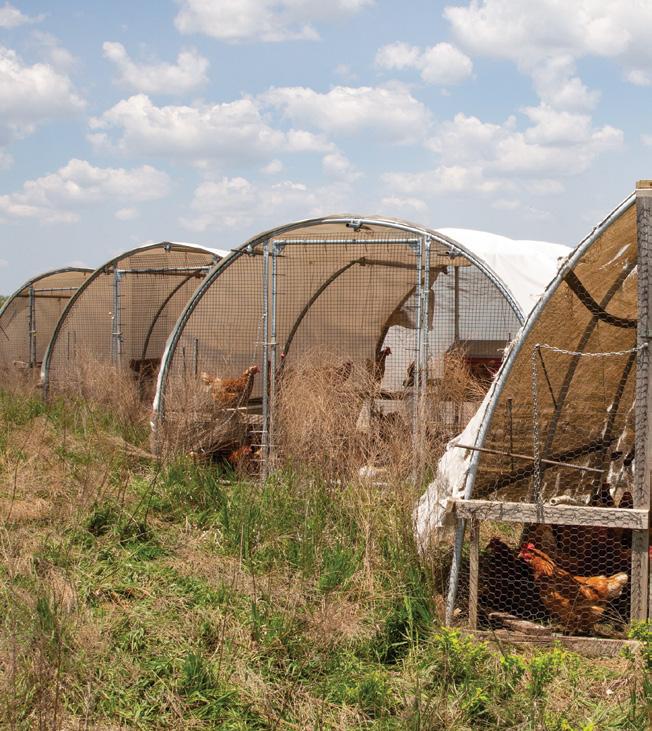
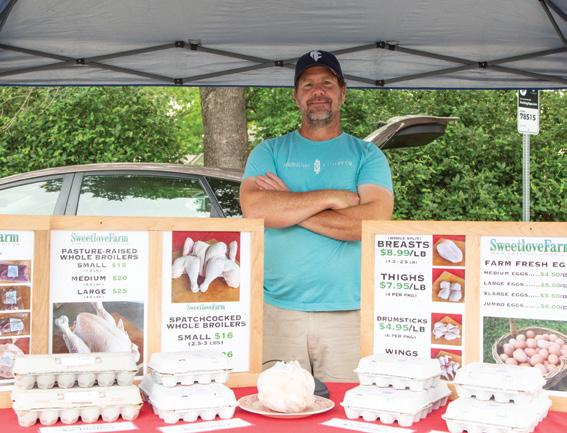
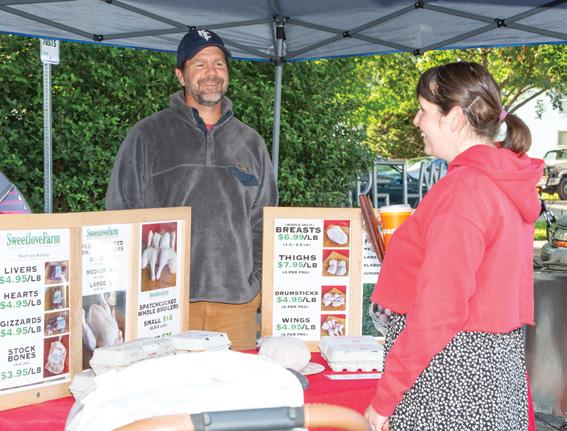
least expense and the smallest amount of infrastructure. “You can start with just a few animals and then gradually grow your way up to many more”


Cattle and other big animals require big infrastructure like good fencing or sorting and handling facilities, and they take longer to get from calf to food.
“The chickens just seemed like the right place to start for a complete novice in terms of scale and handling, and short time from start to finished product,” Holman-Hebert says. It was still a few years after the farm started raising animals in late 2005 before they started selling to restaurants.
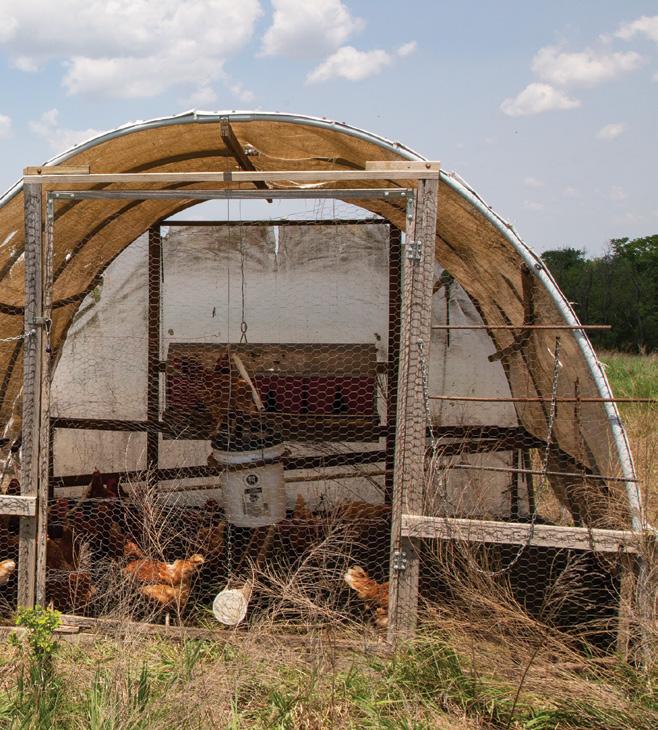
“When we started out, we were just processing the chickens ourselves here on the farm in small batches—40 or 50 birds at a time,” he says. “That way of processing chickens doesn’t allow you to sell to restaurants and grocery stores, or other outlets like that.”
In 2008, Sweetlove started taking their birds to the USDA processing plant in Garnett and getting them processed there, which allowed the farm to sell to a wider array of outlets like the farmers market and restaurants. Then, in 2010, Sweetlove got their first restaurant client, TK Peterson, who at the time was executive chef at the Oread Hotel and trying to get more local produce and local sources for their kitchen. A year or so after that, Peterson and his wife, Emily, opened Merchants, and they’ve remained Sweetlove’s longest-running client.
“I think they’re dealing with us because of some distinctive things that we do,” says Holman-Hebert when asked just why these chefs and restaurateurs use Sweetlove chicken. “One is, these animals live in the pasture, and
what the pasture does allow them to have is a variety of wild seeds, quite a variety of green plants, and they do eat the green plants’ leaves, stems, flowers, seeds, etc.”


The micronutrients and microflavonoids the chickens get from that environment, he adds, are different than they would be if they were just getting a purchased ration—although that is the bulk of the protein the birds receive. Combined with Sweetlove’s diligent approach to rebuilding the soil of his farm, the chickens are exposed to full, rich populations of microbial life in the soil.
Add in an extra week of growth time before the birds head to market, and Sweetlove chicken is well worth the added cost, Holman-Hebert says.


“We have to deal with the reality that chicken, in general, in the marketplace is ubiquitous, and it’s cheap; and it’s cheap and ubiquitous because the industrial methods of raising it have made it that way,” the farmer continues. “In a restaurant setting where the cost of a plate is really, really tightly monitored, and they really have to make the most they can out of every dish they serve, the economics of that are very difficult for most restaurants to manage a product as expensive as ours.”
This means Sweetlove works with chefs that are really committed. A plate of the farm’s chicken at Merchants or a smoked chicken at Fox and Pearl may be expensive, but those chefs recognize the quality and want that to be the reputation of the restaurant, so they have committed to paying more.
“It’s better business for us to sell directly to customers for a lot of reasons,” Holman-Hebert continues. “One is just the economics of it, but I got in business because I love to eat, and I love food.
I love sharing that with people. I love the fact that I know the people that are eating my food. That’s the richest and most rewarding part of my business. I know what they look like. I know who they are. Farmers market. Those are really, really rich relationships, and so aside from the economics, those connections are just fantastic.”
Somewhere in the middle between a producer like Pendleton’s or Sweetlove is Juniper Hill Farm & Table. Located north of the Lawrence airport, the converted barn at Juniper Hill Farm offers weekly pizza nights on Thursdays in the spring, summer and early fall, along with occasional chef’s table dinners curated by celebrated local culinary artisans.
Although it only opened as a venue in September 2022, Juniper Hill’s pizza nights quickly became a hot-ticket item last fall. It’s not surprising, says owner Nancy Thellman.

“It’s kind of a magical mix, because it brings people out to a farm, gets them to feel somehow connected with the farmer and that land, which is important, feeds them well,” she explains. It’s rather surprising how big this has become, and all because of an article her daughter, Katy, sent her from The New York Times.
“It was just like an instantaneous way to see something to do, because I didn’t have my job,” says Thellman, who spent 12 years as a Douglas County commissioner. “I wasn’t old old. I’m old, but I’m not ready to sit on the front porch forever. So we ended up deciding to work on the barn some and see if we could make it into a venue that would be nice for the family but could also be passable as a real business.”
One thing led to another, and what originally was going to be Thellman putting a few bricks together and calling it a pizza oven, and having it really rustic and super-simple changed, as does everything the Thellmans put their mind to at Juniper Hill.
“Everything we do out here luckily turns into pretty serious work,” Thellman explains. Her husband, Scott, known as “Old Scott” as opposed to their son, “Young Scott,” who runs the farm, wired everything up and did a lot of carpentry and some plumbing. Then Thellman laid the floors and brick in the barn.
“These used to be dusty gravel floors,” she says, gesturing to the laid brick just outside the room in which we’re speaking. “I did the brick work in the sidewalk and then the patio. All that stuff. It was just like every day there was something serious to do and exhausting, which was really good. You can see, literally, brick by brick, the progress. It’s slow and tedious, but for me, it was just magical.”
It’s a lovely new adventure for her, Thellman says, to have a whole different career at the age of 65. During her time on the county commission, one of the driving things behind her was to
try to elevate family farms and get people to appreciate how lucky we are in Douglas County to have farms of all types encircling the community.

“They provide beauty and space, and a pretty big part of the Douglas County economy,” she says. “Even more than that, some of the farms around Lawrence provide actual food. Not just the commodities which are super important, like corn and soy, but fruits and vegetables, and goat farms for cheese and dairy, and all the things you go to the grocery store for.”
Many of these farms now are filling some of the shelves at the grocery store or bringing tons of food to the farmers market each week, and that’s important, Thellman explains.

“In our farm’s case, because of [Young] Scotty’s work and his fabulous crew, they’re providing to many of the restaurants and several of the grocery stores here,” she says with pride. “A lot of the Whole Foods stores in Kansas City, restaurants in Kansas City, wholesale businesses in Kansas City, that then distribute some of their product all the way up to Michigan.”
For all the distribution the farm sees, it’s the farm-table aspect of Juniper Hill that Thellman sees as important for the connections to the immediate community. Some of that food gets to stay right there, and people get to experience a pizza that’s made with tomato sauce from tomatoes grown within sight of where the pizza is being made.
“You can talk to the guys who actually put the plants in the ground and kept them going and harvested them,” Thellman relates. “Part of the crew who does the really
 Lawrence Humane Society Friends enjoy dining outdoors at Juniper Hills Farm
Lawrence Humane Society Friends enjoy dining outdoors at Juniper Hills Farm
hard work is often here continuing the hard work to put those pizzas together, and I think they appreciate that full-circle experience.”
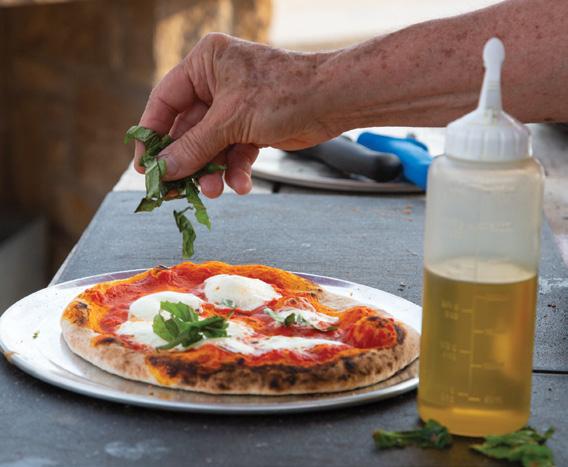

If there’s a seasonal squash or something that makes a good white vegetable sauce, that happens, as well. Many of the toppings are just fresh produce off the farm, she explains.
“And if our farm doesn’t grow it, then we’ll do everything we can to buy from other local farms and support their business, too,” Thellman says. It’s a beautiful thing to be around and see this shift in Kansas, she adds.
“In Kansas—in this place,” she says. “It’s a remarkable adventure.” p














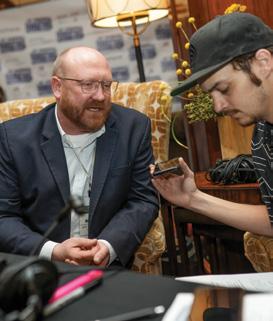




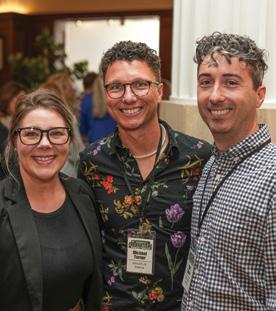









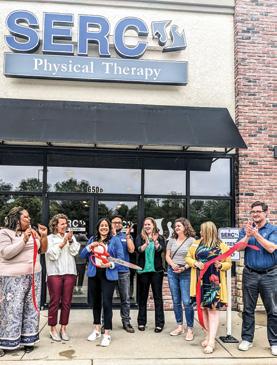









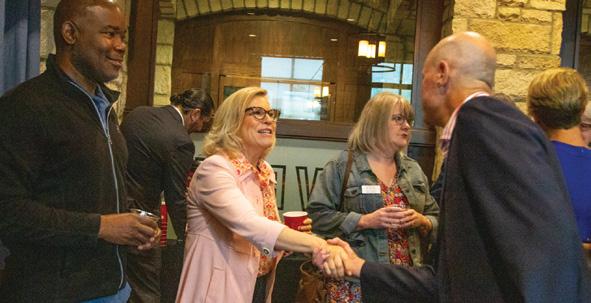






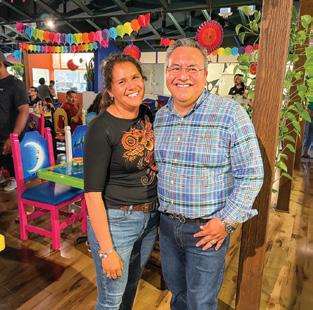




















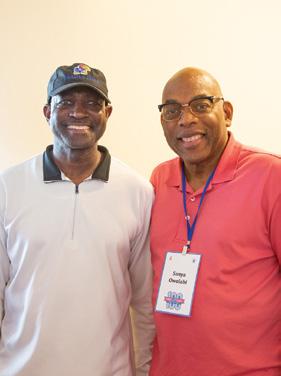









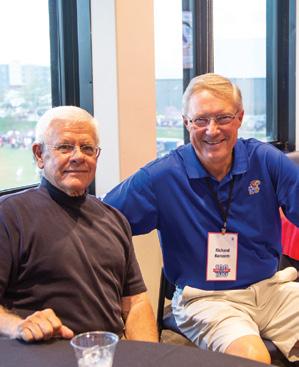











Good Energy Solutions’ president and cofounder, Kevin Good has been included on Ingram’s Magazine list of “50 Kansans You Should Know.”
Mr. Good is recognized for his track record of building a thriving business that specializes in residential and commercial solar installation. According to the Kansas City-based business magazine, “The Lawrence company he and his wife founded in 2007 is on a four-year winning streak in Ingram’s Corporate Report 100, a list of the fastest-growing companies in the Kansas City area.”
Ingram’s Magazine created the list of notable business, nonprofit and government leaders as a way to shine a spotlight on the Kansans that are pushing the state’s economy forward. The Kansas City publisher believes “In doing so, they elevate the quality of life for nearly 3 million residents.”
One of the reasons Good has enjoyed continued success with his company can be summed up in one word, quality. From the high-caliber people that he hires, to the best in class solar equipment installed on homes and businesses, to the workmanship warranties his company guarantees for 25 years, it all starts with offering customers a best-in-class experience Good says, “People that hire us are amazing in their own right because they are pioneers—they’re thinking forward, and that’s really why we started this in the first place.”
Good Energy Solutions designs and installs solar panel systems for homes and businesses in Northeast Kansas and the Kansas City area. The company’s electrical division was recognized in 2022 as the winner of Best of Lawrence in the electrician category.
Samatha Gauthier
Satsuma Esthetics is a newly opened spa in Lawrence, KS. The owner, Samantha Gauthier, is taking a holis:c, organic, and clean approach to skincare and full body waxing. This woman-owned business just opened on March 2nd 2023.

Some of Samantha’s best services are full body waxing, lash liJing and helping other mothers with customized skin treatments.
She is inside Salon Luna at 3013 Four Wheel Drive Suite 4, Lawrence, KS, 66047.

The Greater Topeka Partnership and The Chamber, Lawrence, Kansas, are excited to announce the 2023 Topeka-Lawrence “City Swap” event, taking place Oct. 1213, 2023. This event will bring together business leaders, elected officials, and community stakeholders to participate in a tour of each city. The two-day event will feature speakers, networking, and opportunities to learn about the exciting developments in each community. The City Swap is a follow up to the joint intercity visit the two cities collaborated on in 2022.
“We are thrilled to partner with the Lawrence chamber for this exciting event,” said Matt Pivarnik, CEO of the Greater Topeka Partnership. “This City Swap is a unique opportunity for our two cities to come together, exchange ideas, and showcase the strengths and successes of each community. Our cities have a common economy, and our future will be stronger through collaboration and shared regional strategic goals.”
Bonnie Lowe, CEO of The Chamber, Lawrence, echoed Pivarnik's sentiment.
“This event will provide an excellent platform for the business leaders, elected officials, and community stakeholders from both cities to connect and collaborate,” Lowe said. “We believe this will lead to increased economic opportunities and a more dynamic partnership between our two communities.”
The 2023 Topeka-Lawrence City Swap event will be in Topeka on Oct. 12, and Lawrence on Oct. 13. Both cities will feature tours, speakers, and presentations highlighting their thriving business communities and recent developments.
This event is open to anyone who is interested in learning more about the strengths and successes of these two vibrant communities. To register or learn more about the 2023 Topeka-Lawrence City Swap, visit: TopekaPartnership.com/TopekaLawrenceTogether.


Be the first to correctly guess which local business figure works behind this desk. Winner receives a $50 gift card to 23rd Street Brewery. facebook.com/lawrencebusinessmagazine




